Prototyping AI tools refers to the process of rapidly designing, building, and testing early versions of artificial intelligence applications. This kind of tool facilitates developers, data scientists, and product teams in experimenting with AI models, testing ideas, and iterating on solutions before complete development. Whether developing a chatbot, computer vision system, or predictive analytics engine, prototyping tools offer a low-risk, high-efficiency way to turn AI ideas into reality.
Through the use of frameworks, pre-trained models, drag-and-drop interfaces, and cloud-based platforms, prototyping with AI dramatically decreases time and technical overhead needed in the initial development. Some of the most popular tools such as Bolt AI, ClickUp AI, and Lovable, enable anyone, from beginner to expert, to design intelligent systems for numerous real-world applications.
Bolt AI
Bolt AI is an in-browser, AI-based web development assistant aimed at assisting users in developing full-stack, JavaScript-based web applications in real time, in a chat-based interface. Bolt is built by StackBlitz and employs WebContainers to give you an immediate development environment where live code changes occur as you ask the AI. It's compatible with libraries such as React and Next.js and has native integration with solutions such as Figma (design), Supabase (backend), Netlify (deployment), GitHub (version control), Expo (mobile), and Stripe (payments). Whether you are launching a blog or a sophisticated productivity app, Bolt gives you the ability to go from concept to ship fast—no setup needed.
Key Features
Let's go through some features of the Bolt AI.
- Prompt-to-App Generation
Bolt AI allows you to describe the app you want to build in natural language prompts. It then generates the entire codebase, including frontend, backend, and database structures.
- Browser-Based Development
Bolt AI operates entirely within the browser, eliminating the need for local setup, environment configurations, or installations.
- Full-Stack Support
It supports popular frameworks like React, Vue, Node.js, Express, Next.js, and integrates with databases like PostgreSQL and services like Supabase.
- Visual Editor
Bolt includes a visual editor that allows you to inspect, edit, and preview the generated components in real time.
- One-Click Deployment
When your app is ready, you can deploy it to platforms like Netlify with a single click.
- Error Detection and Fixing
The AI assistant actively monitors your code for errors, provides real-time suggestions, and can even help fix issues through the chat interface.
- Customization
You can add custom UI blocks or logic using React/JavaScript and even install NPM packages to tailor the generated code to your specific requirements.
- Collaboration
Bolt allows easy sharing of projects through links, facilitating collaboration with others.
- No Vendor Lock-in
You own the generated code, giving you the flexibility to download it, self-host, or deploy it to other platforms.
Gets started
Setting up an account on Bolt AI is straightforward. At the top-right corner, users can easily connect to the Bolt community through platforms such as Discord, LinkedIn, X (formerly Twitter), and Reddit. Upon clicking the Sign In button, users can log in to Bolt AI using their Google or GitHub accounts.
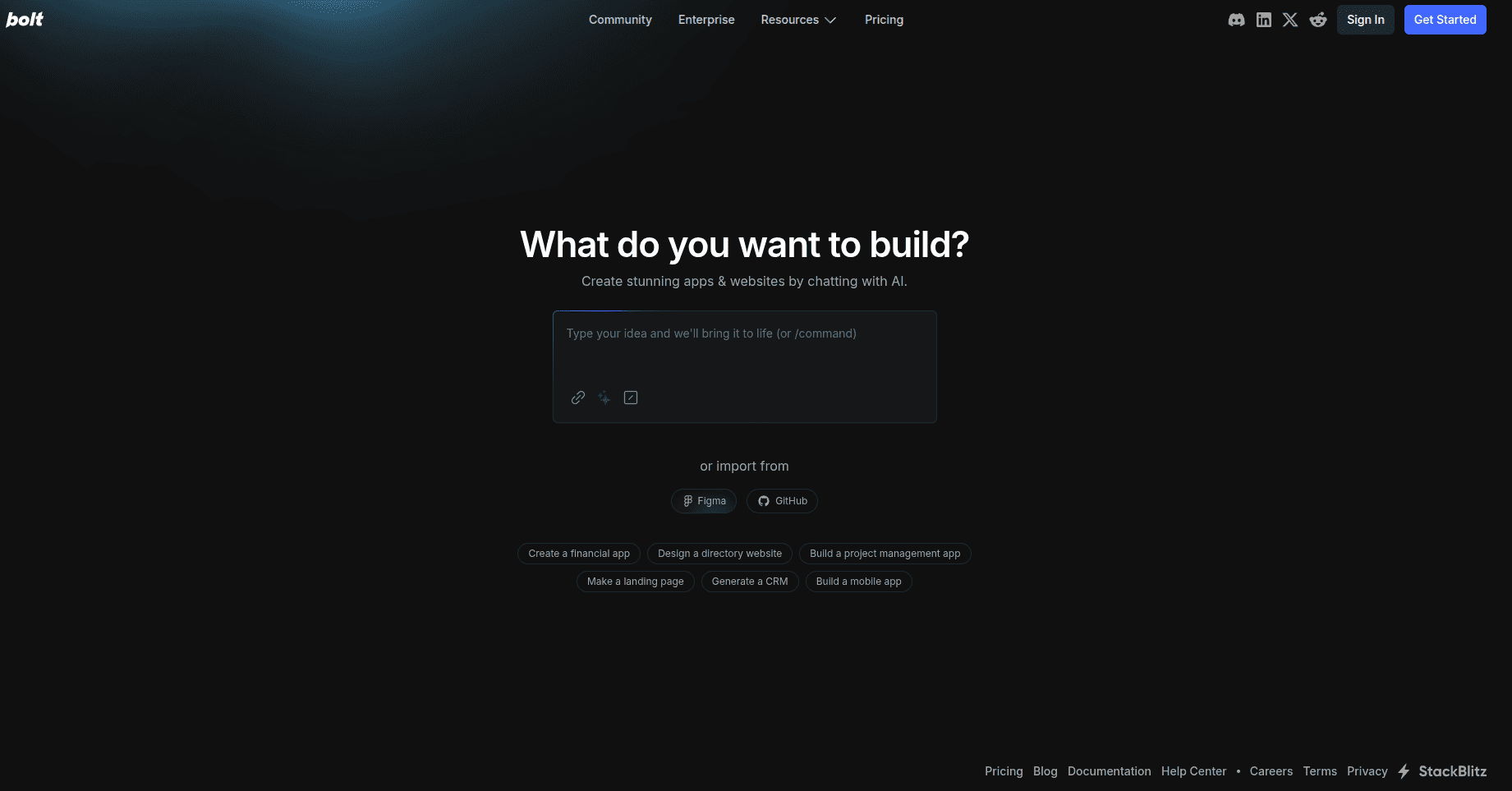
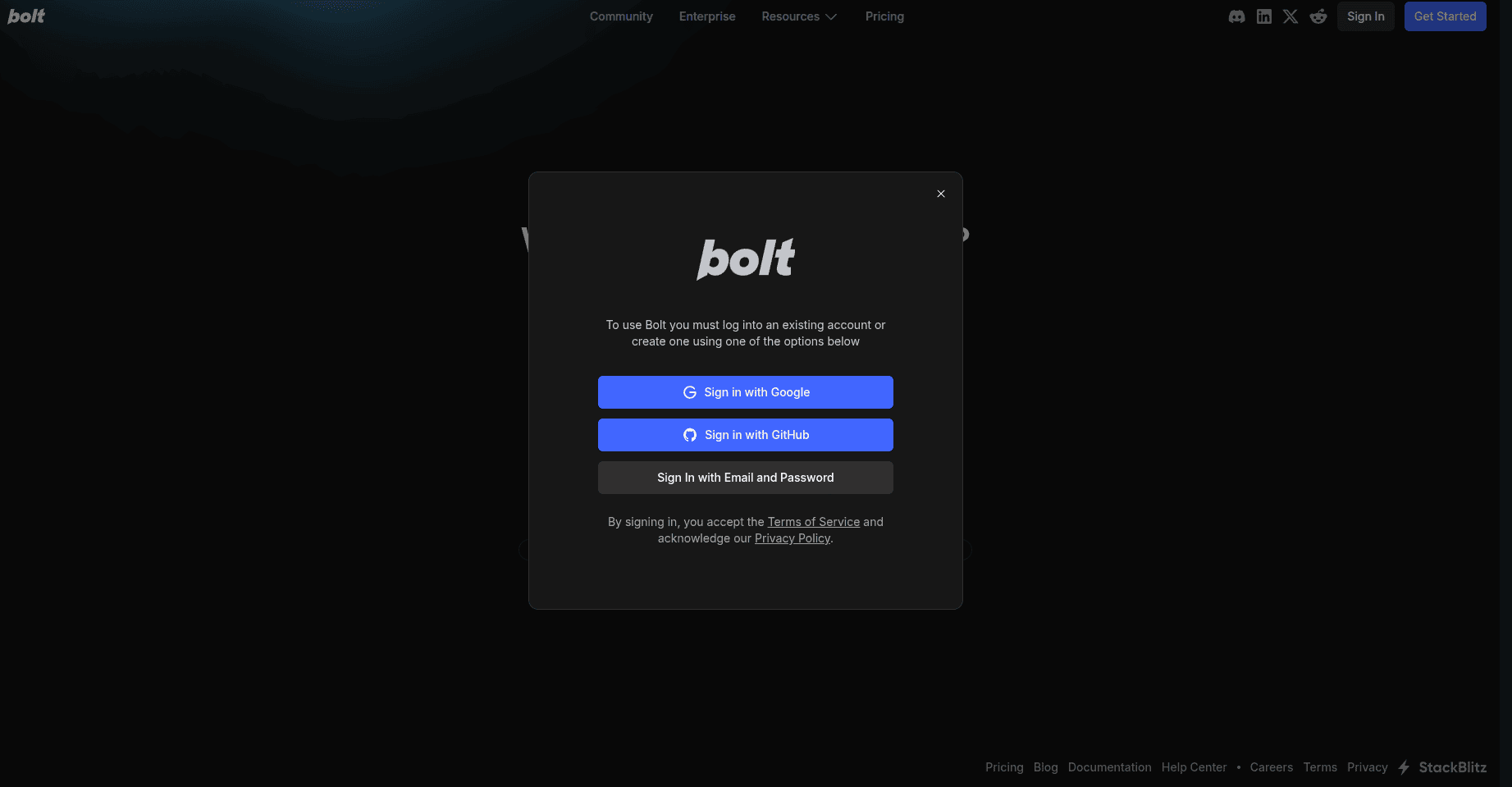
Example
Let’s explore an example using Bolt AI. In this case, I provided a command to create a POS (Point of Sale) screen with kiosk functionality. Bolt AI generated an interactive POS interface, complete with features that allow us to simulate payment for purchased items.
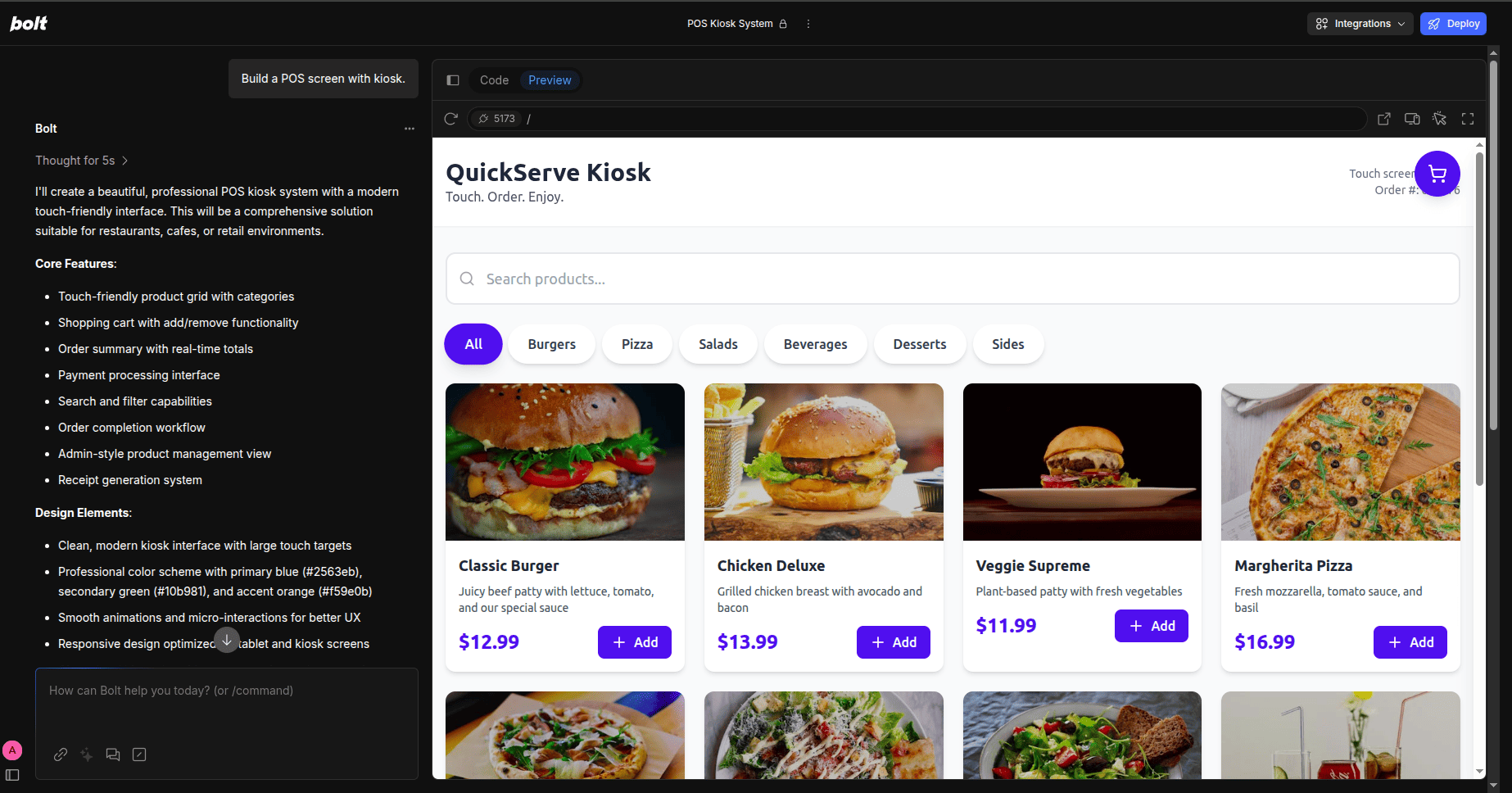
A preview of the templates, code, and corresponding explanations is provided. Users can test the functionality and make modifications as needed.
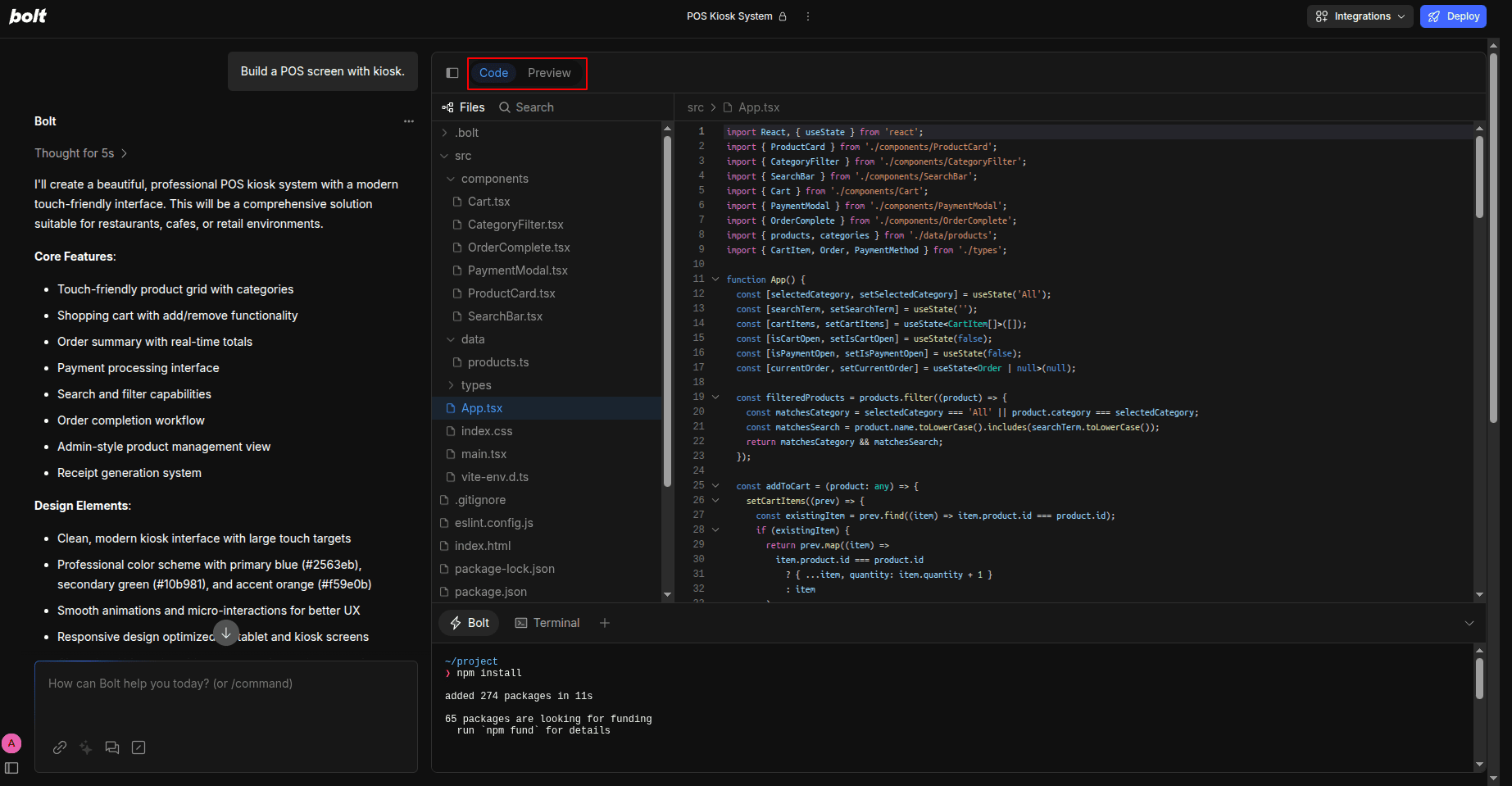
The preview can be opened in a separate tab for better accessibility. Additionally, a mobile view is available, allowing users to test the interface across various mobile device screen sizes.
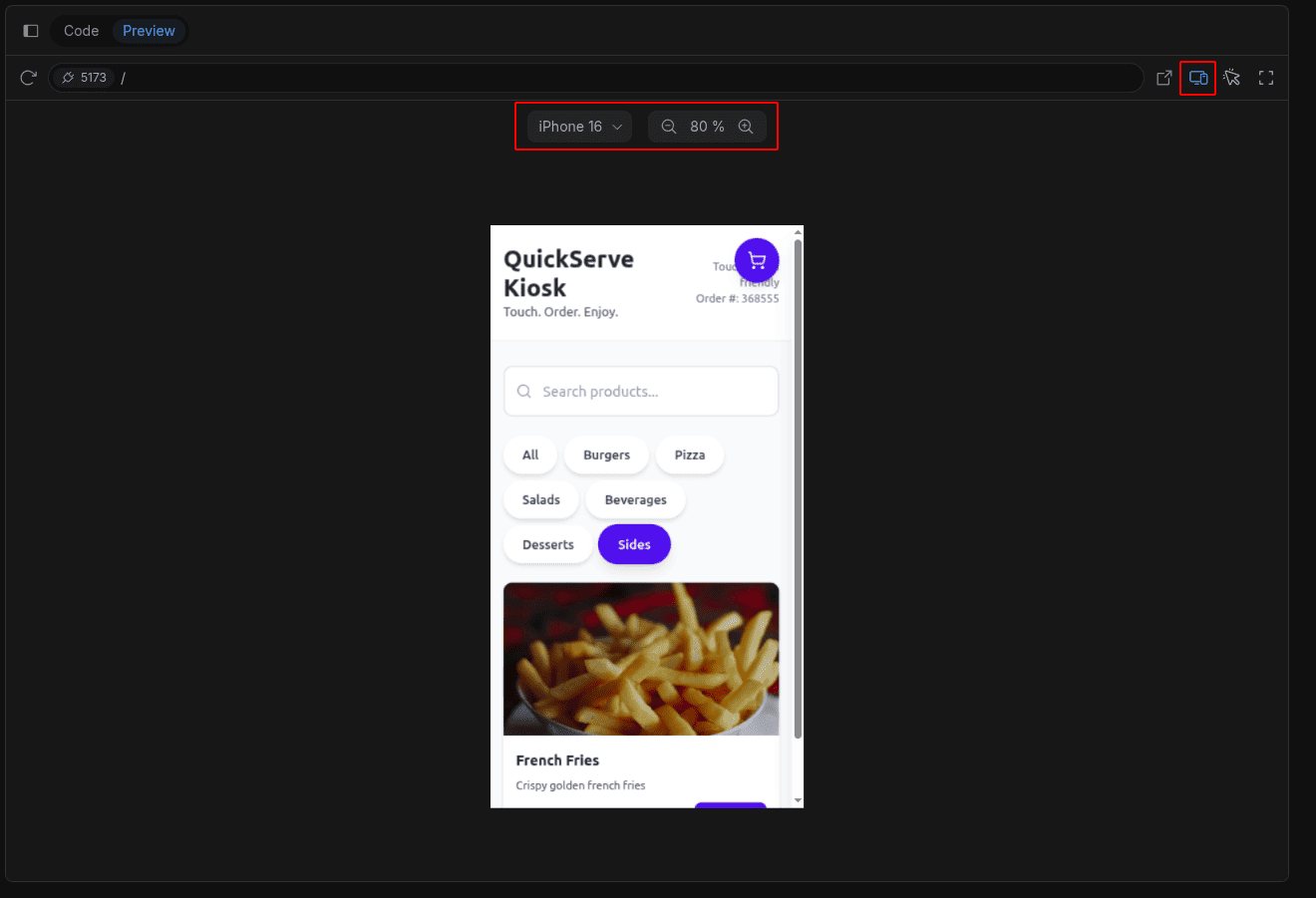
Users can inspect the template and modify the styling as needed. Bolt AI also provides the option to enquire about specific inspected regions, enabling more precise and informed customisation.
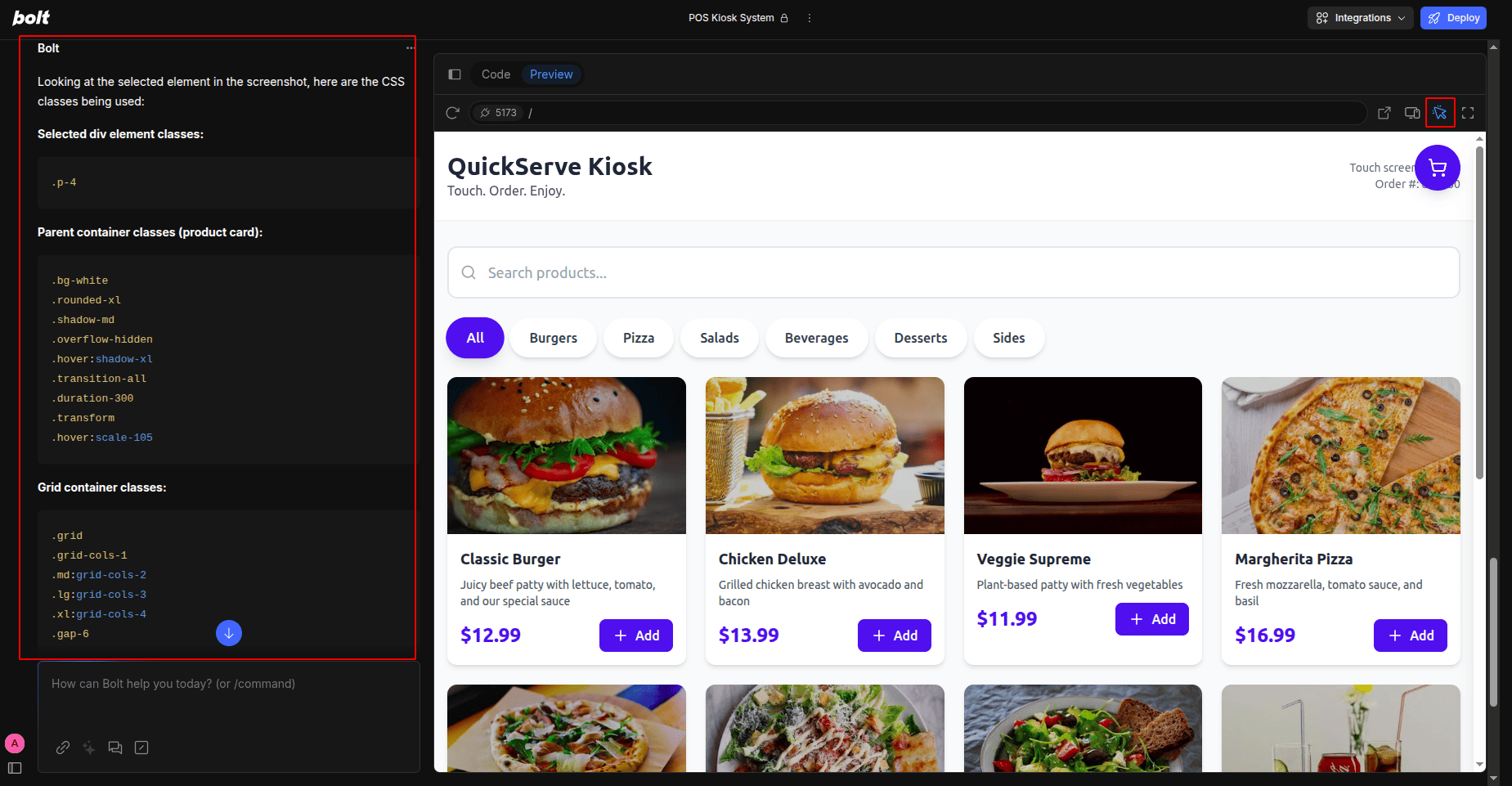
We can also view the project in fullscreen.
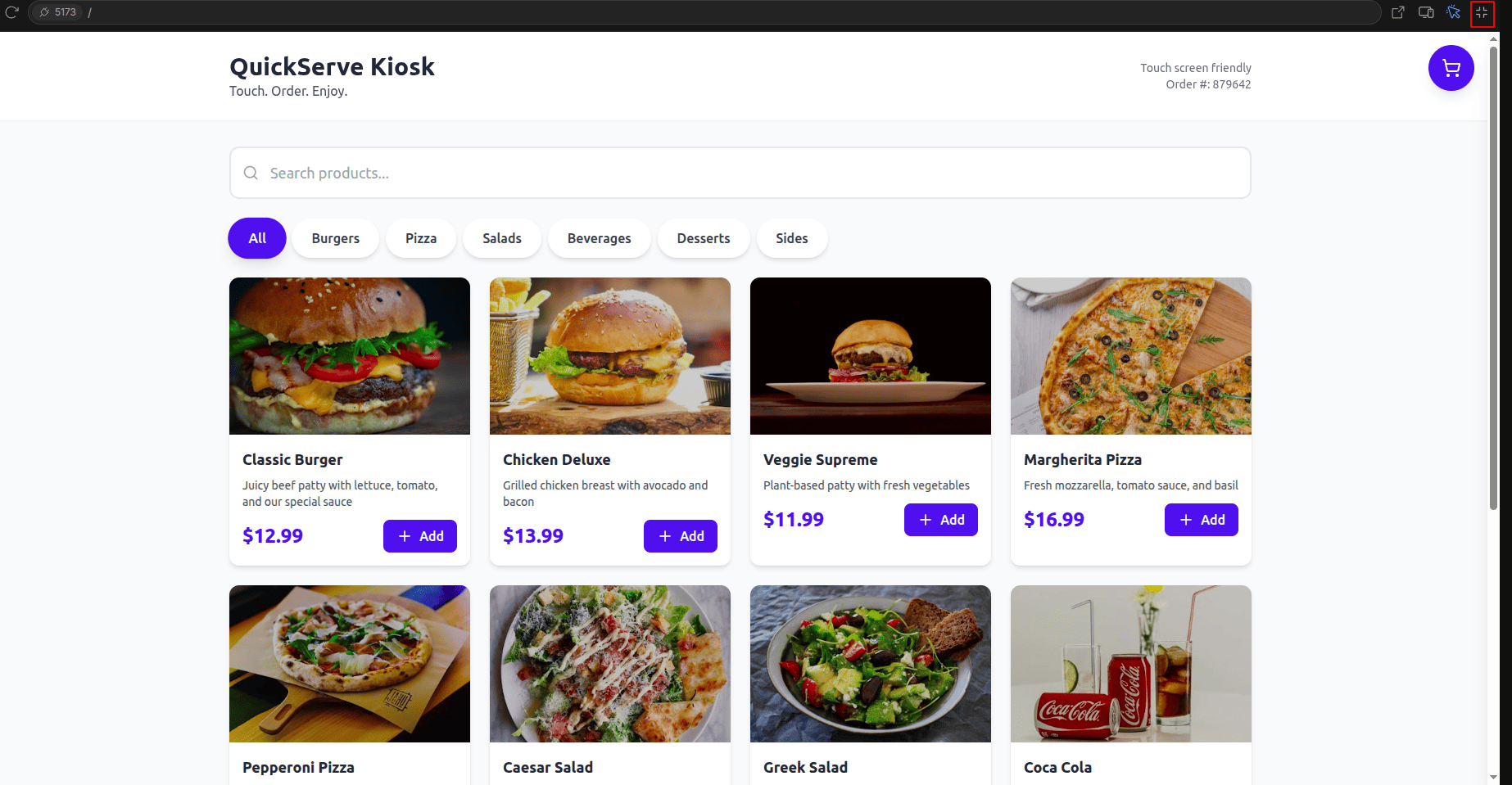
Projects can be renamed or duplicated. When duplicated, a copy is created with all the features and configurations of the original project, including the preview functionality.
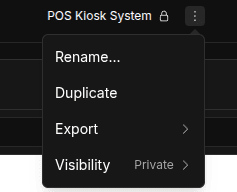
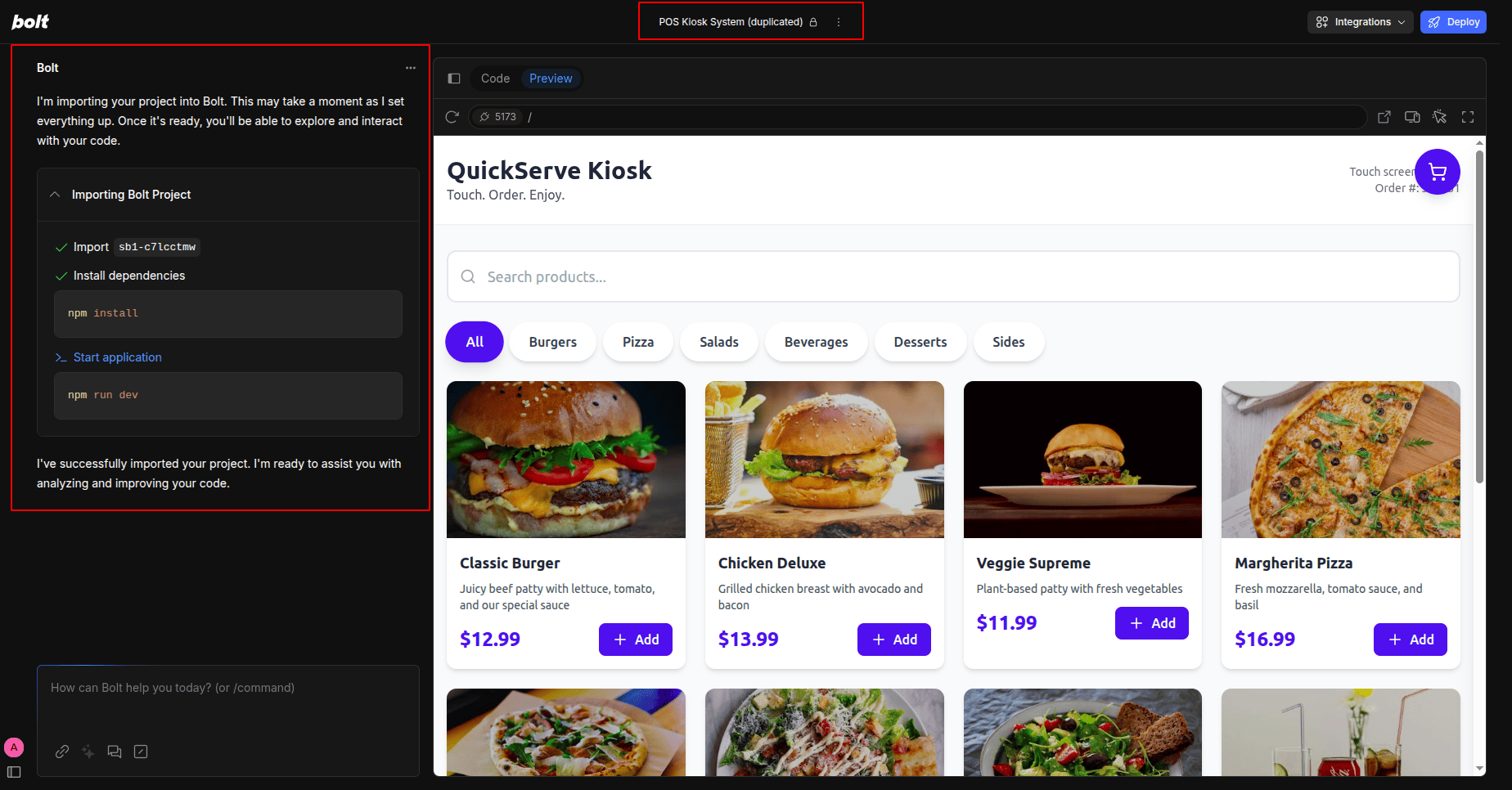
Bolt AI provides an option to export the project. Users can download it as a ZIP file or open it directly in StackBlitz for further development.
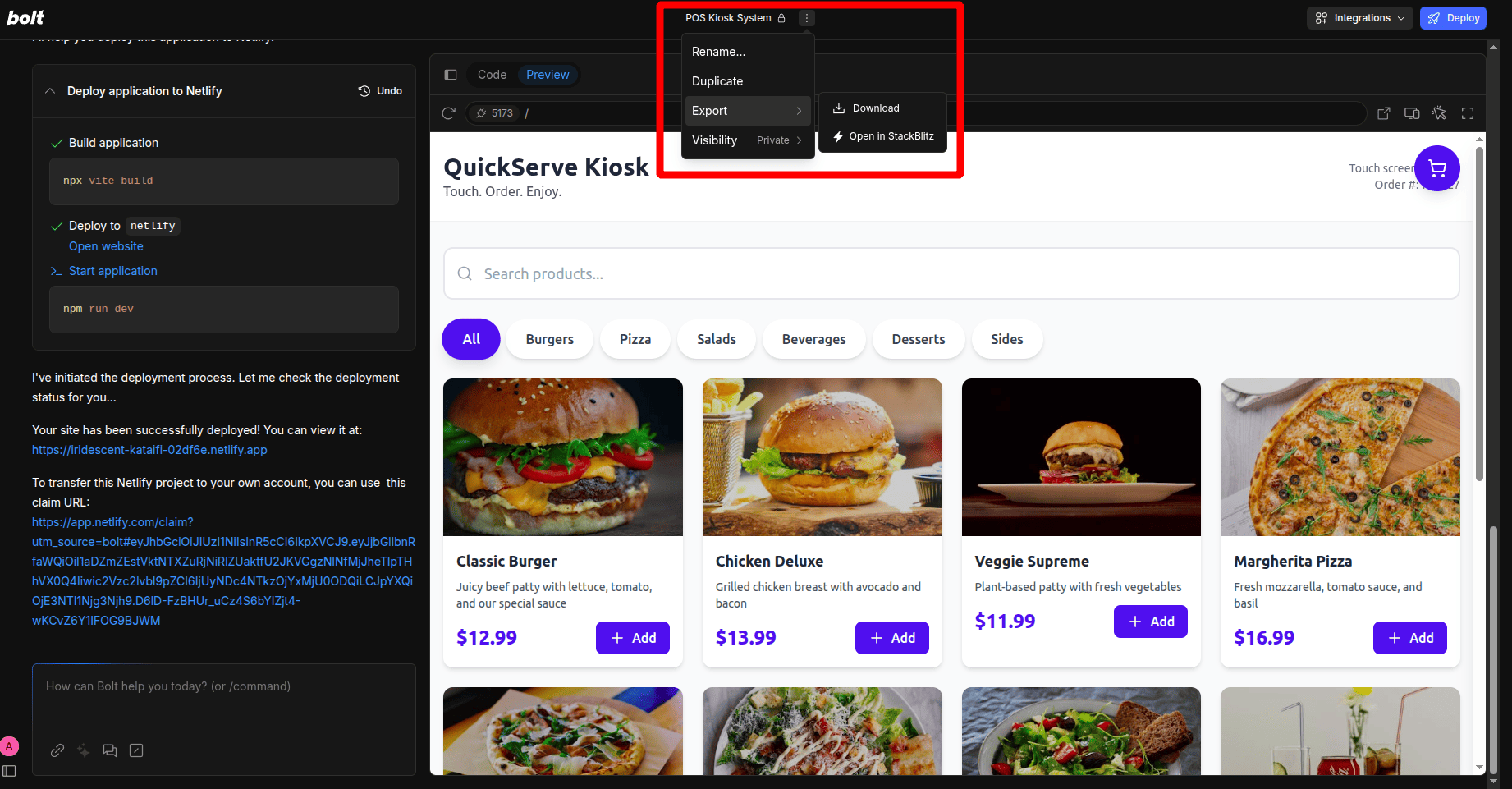
Under the visibility menu, we can manage the visibility of the project. By default, it will be private.
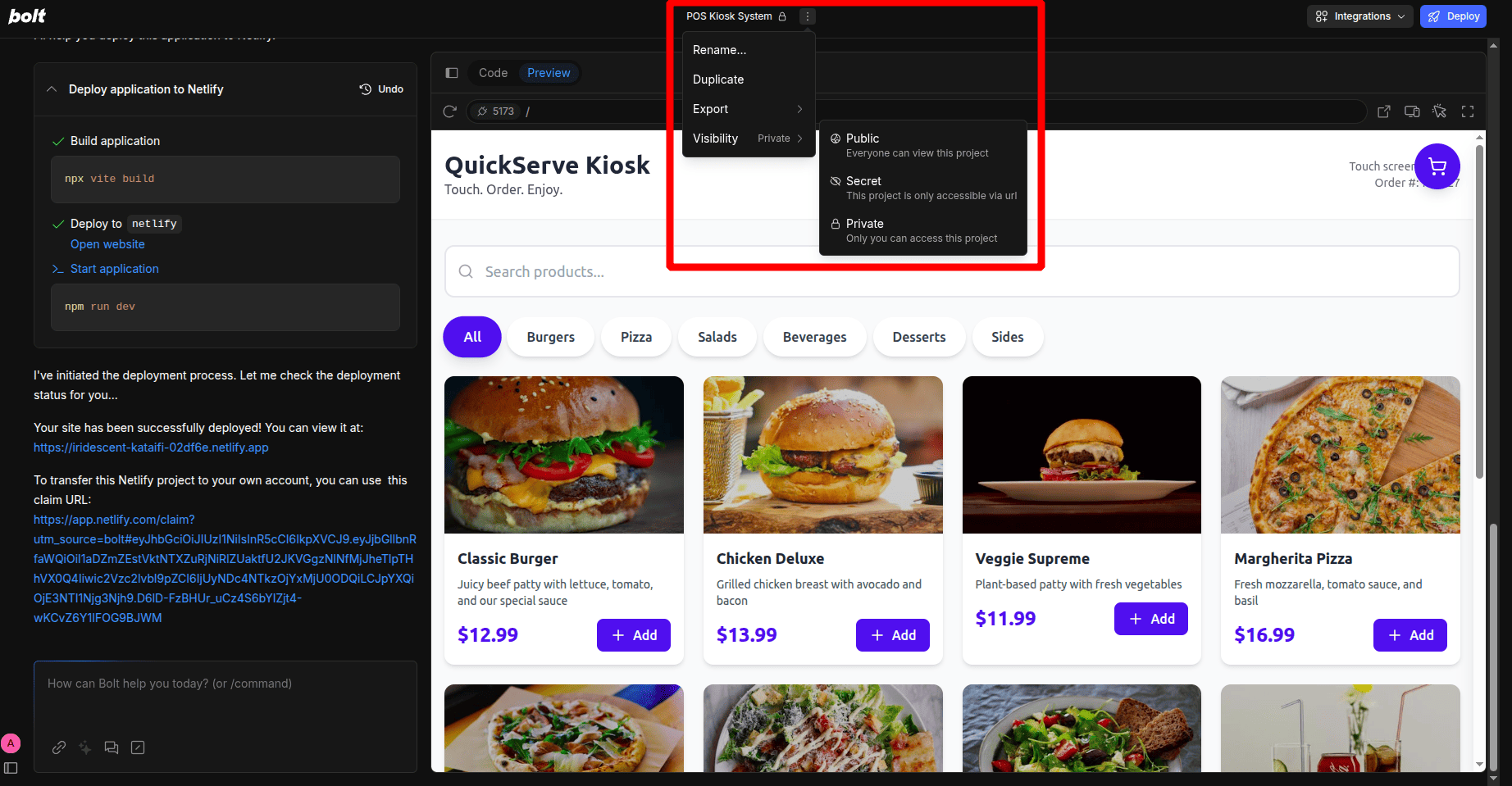
To integrate your system with external service providers for payment processing, database management, or version control, Bolt AI offers direct integrations with Stripe, Supabase, and GitHub.
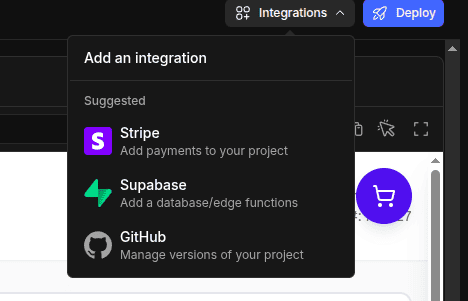
The project can also be deployed directly to Netlify by simply clicking the Deploy button located in the top-right corner.
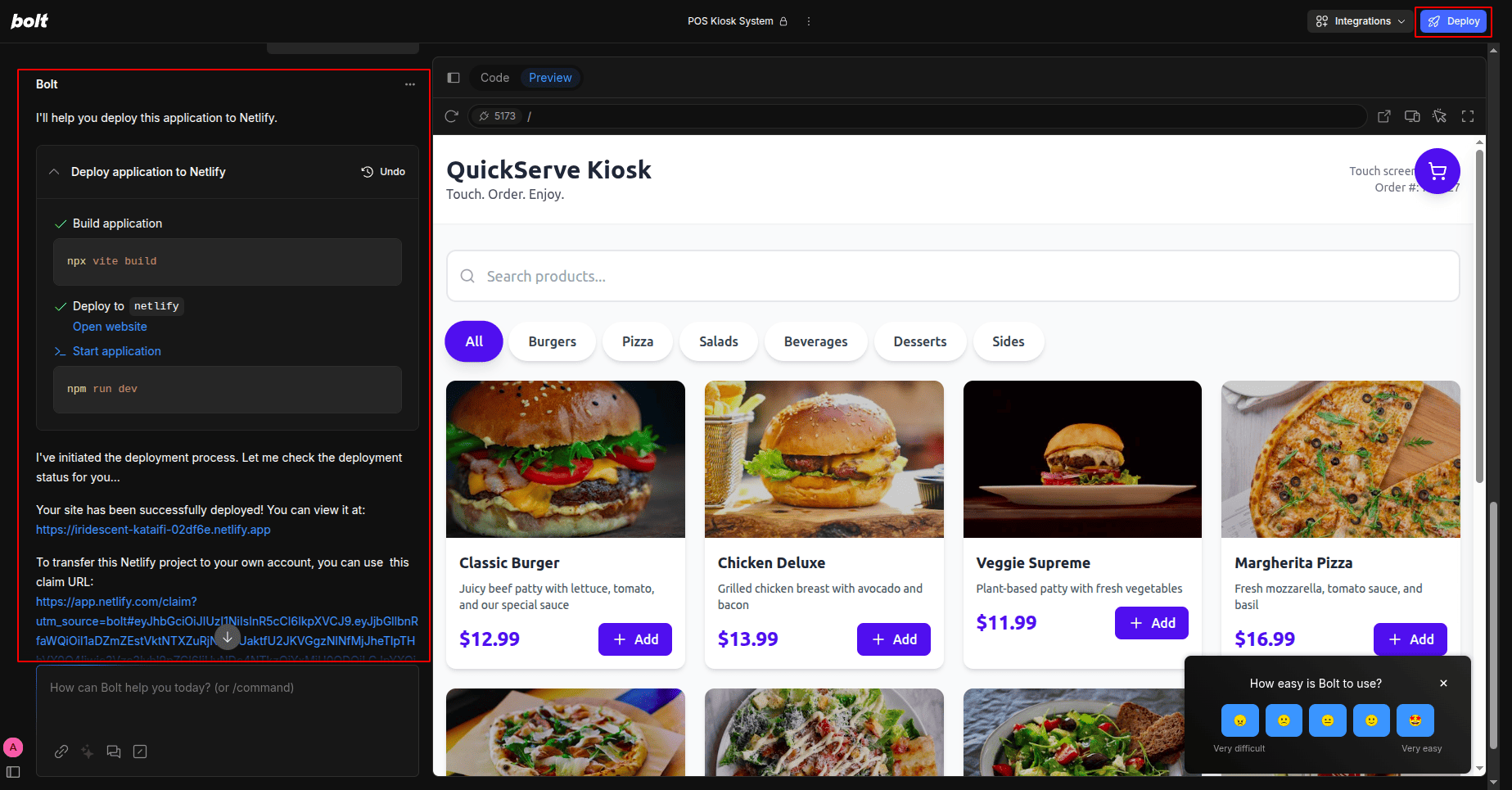
After clicking the provided link in the chat output, you will be redirected to the Netlify website, where you can choose a project hosting service such as GitHub, GitLab, or Bitbucket to host your project. Otherwise, you will need to set up Single Sign-On (SSO) through Netlify to complete the deployment process.
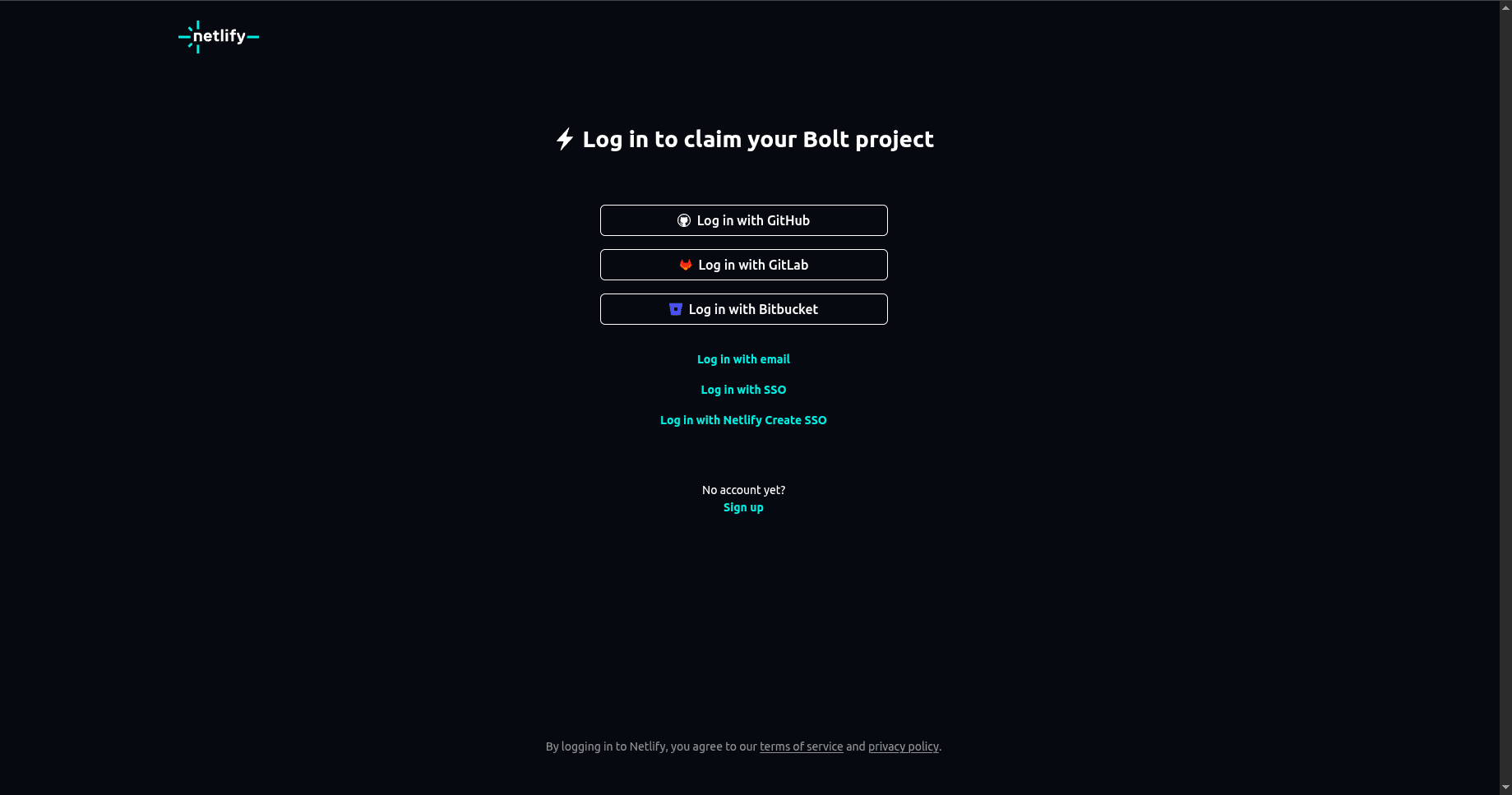
Additionally, there are four icons located beneath the chat input box.
- Link Icon – Attach Resource / Link Command
This option is typically used to attach resources such as URLs, files, or reference commands related to your current task or request. It helps Bolt understand context or pull in external resources.

- Magic Wand Icon – Run AI-Powered Command
Triggers AI actions like enhancing prompts, transforming text, or running predefined code operations. It's often used to "spark" something based on your input.

- Chat Bubble Icon – Open Thread or Comment
This opens up a comment or threaded conversation, possibly to provide additional context, ask follow-up questions, or carry on a side discussion related to the current development prompt.

- Square with Pen Icon – Edit Code or UI Block
This likely opens an inline code or UI editor, allowing you to make direct changes to a component or template. It provides a way to manually tweak or refine the generated output.
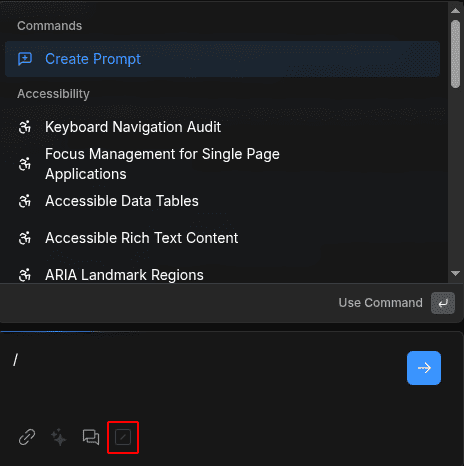
Lovable AI
In the dynamic world of AI innovation, prototyping platforms are responsible for facilitating breakthroughs. Among those, Lovable AI is a user-friendly platform aimed at demystifying and streamlining the development of AI experiences. As a designer, developer, or entrepreneur, Lovable AI offers accessible tools to brainstorm, experiment, and iterate AI solutions without requiring in-depth technical knowledge.
With no-code interfaces, prompt engineering assistance, and real-time feedback loops, Lovable AI facilitates lightning-fast iteration of conversational bots, generative models, and intelligent assistants. Its focus on usability and human-centred design makes it particularly useful for organisations wanting to prototype ethical and enjoyable AI that humans really want to engage with.
Key Features
Let's go through some features of the Bolt AI.
- Core Development Features
- Full-stack web app creation using React, Vite, Tailwind CSS, and TypeScript.
- Real-time preview – see changes instantly as you build.
- Supabase integration for backend capabilities (database, authentication, file storage).
- Responsive design generation with beautiful, modern interfaces.
- Visual Editing
- Visual Edits – select and edit elements directly on the page.
- Direct editing of text, colours, and fonts without using credits.
- Prompt-based edits for layout and functionality changes.
- Works on static elements for quick, targeted updates.
- Development Tools
- Dev Mode for viewing and manually editing code.
- Debugging tools with access to console logs, network requests, and codebase.
- Component-based architecture with reusable design systems.
- GitHub integration for code synchronisation.
- Project Management
- Project remixing – fork/copy existing projects.
- Version control – revert to previous versions.
- Custom knowledge – add project-specific information and instructions.
- Project renaming and organisation.
- Deployment & Hosting
- One-click deployment via the Publish button.
- Custom domain connection (requires paid plan).
- Lovable staging subdomains for testing.
- Collaboration Features
- Discord community for support and collaboration.
- Step-by-step tutorials and YouTube playlists are available.
- Incremental development – build features in smaller steps.
Gets started
We need an account in order to start exploring Lovable AI.
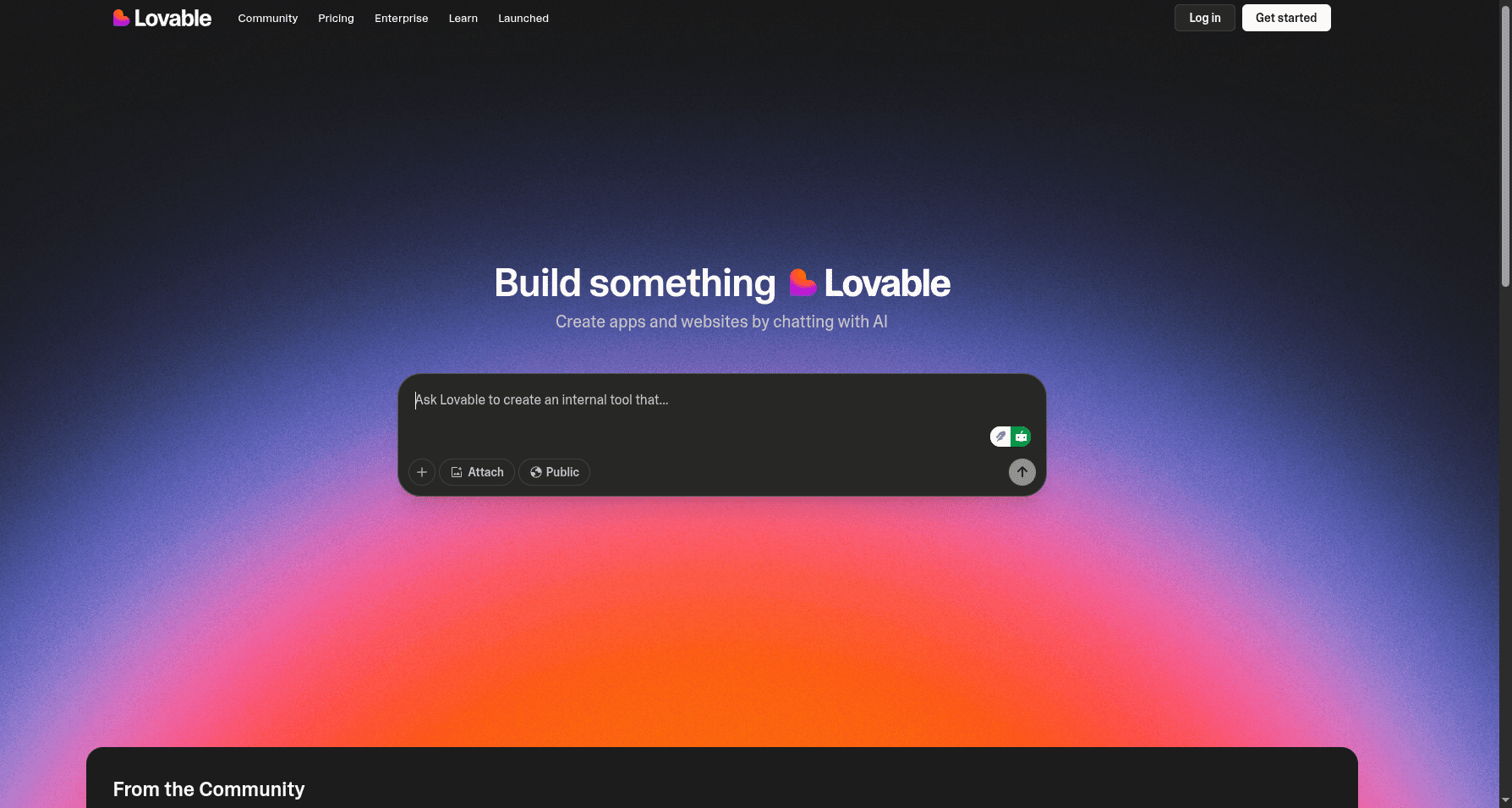
We can use Gmail and GitHub accounts to connect Lovable.
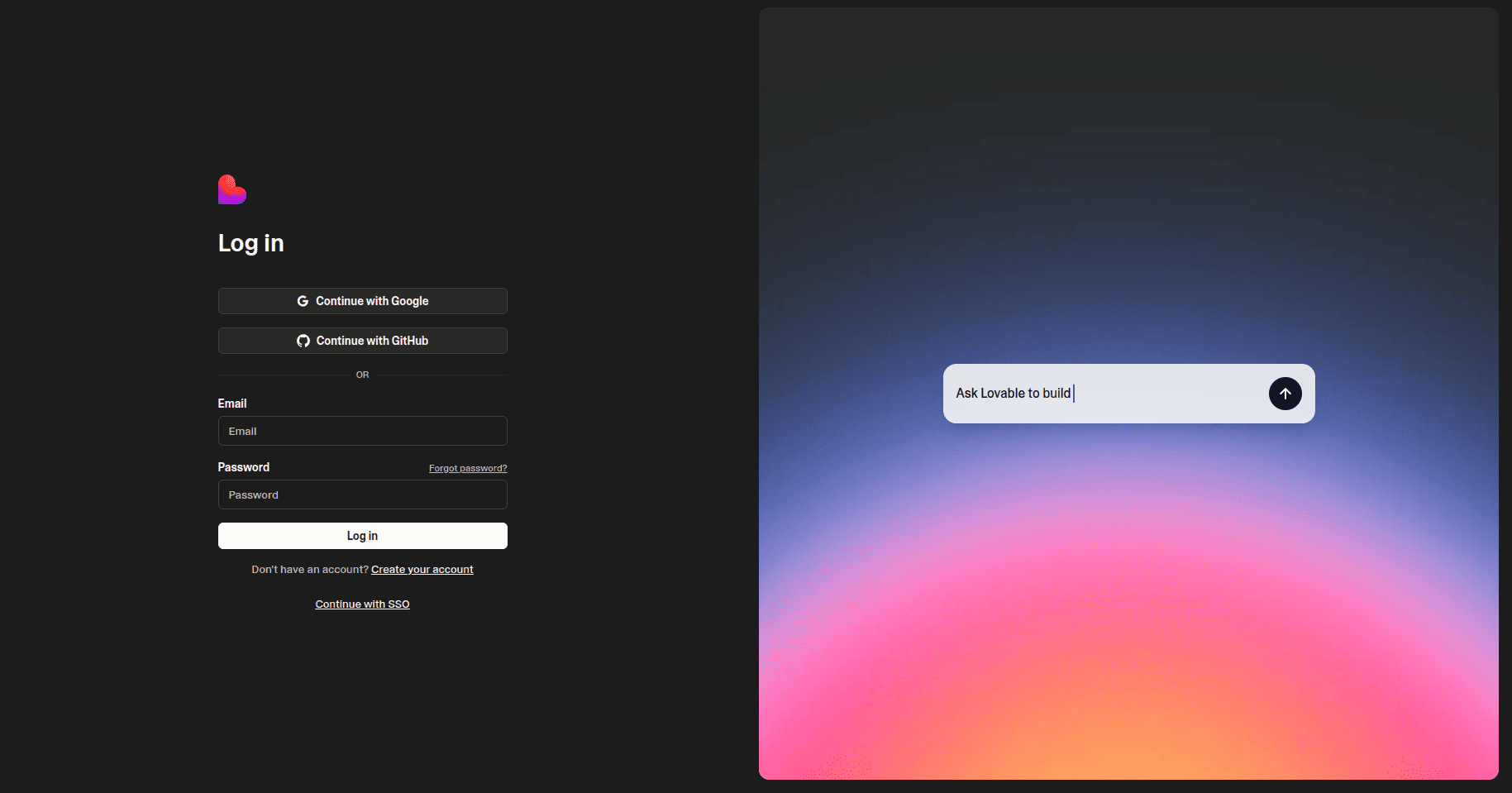
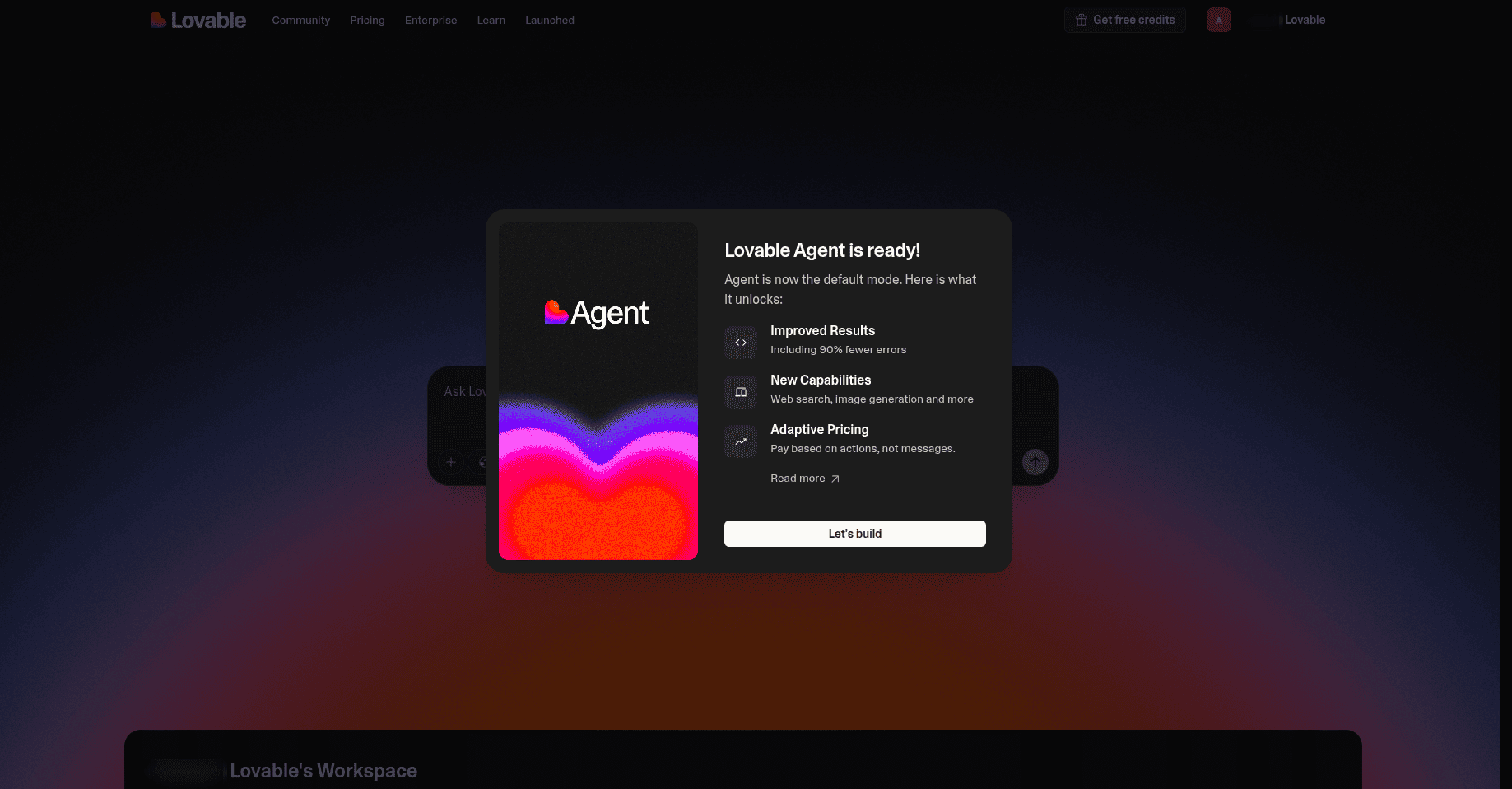
Example
Let's look at an illustration. Here, I've instructed the creation of an Odoo 18 dashboard that shows monthly sales and purchases. And it developed a great dashboard that shows monthly changes and profit. Even a year filter was given to us.
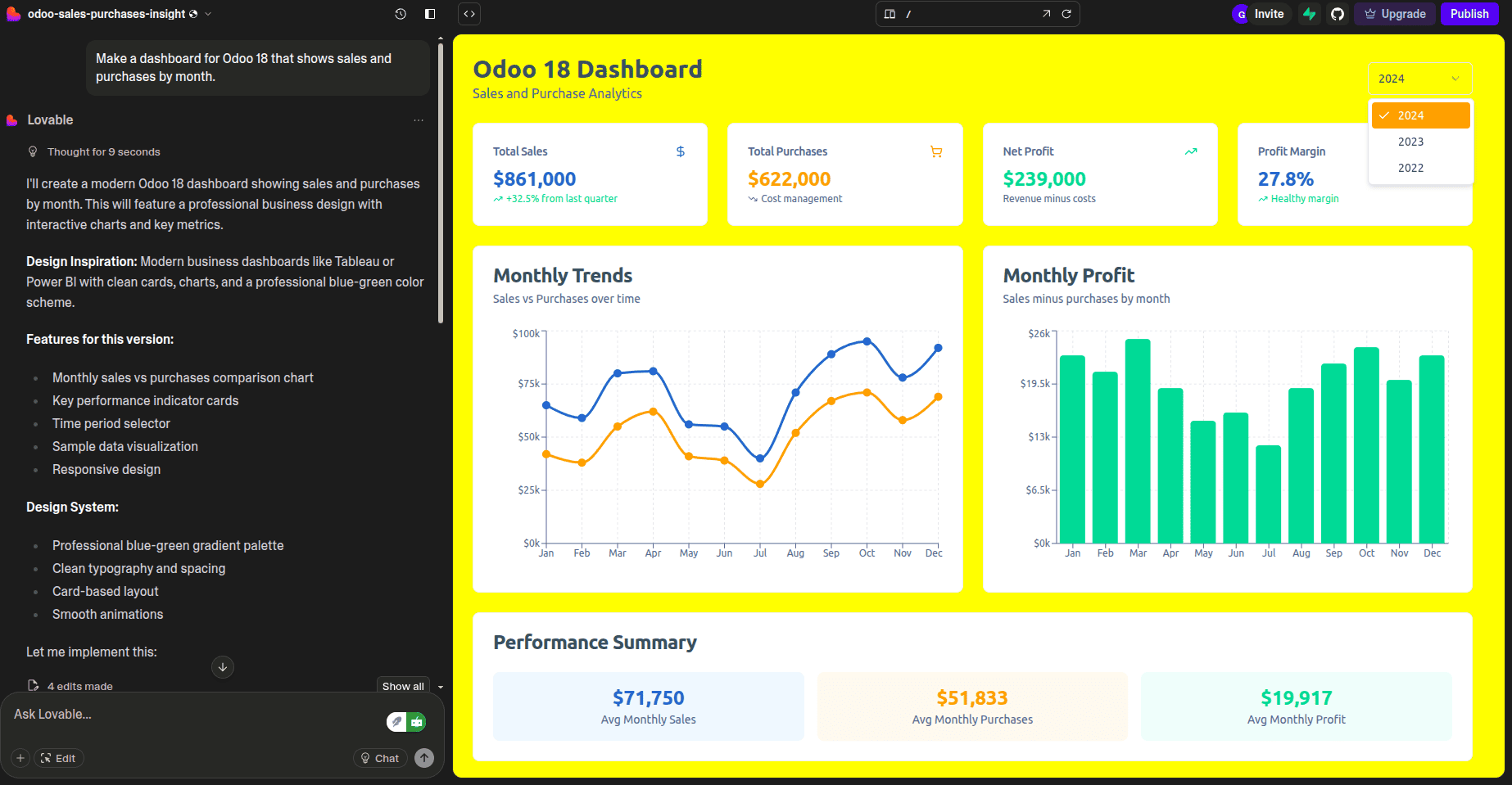
If we want to get the code of this project, we can just click on the code button. Also, we can connect with Supabase.
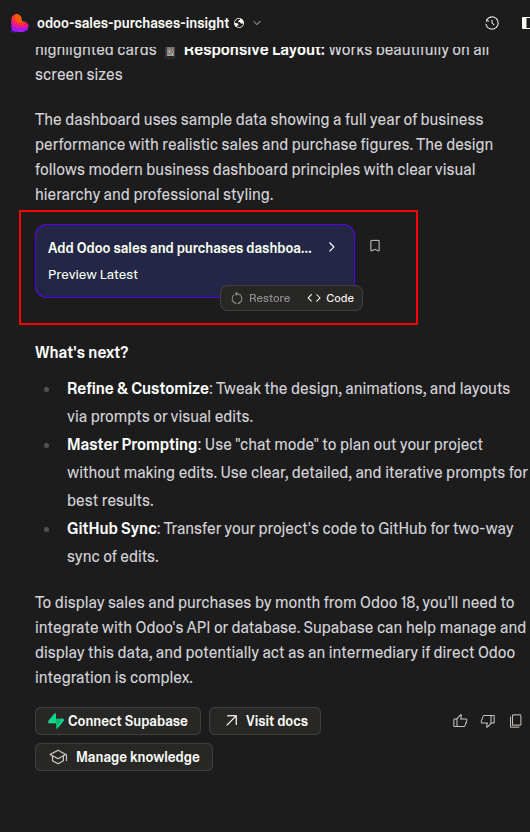
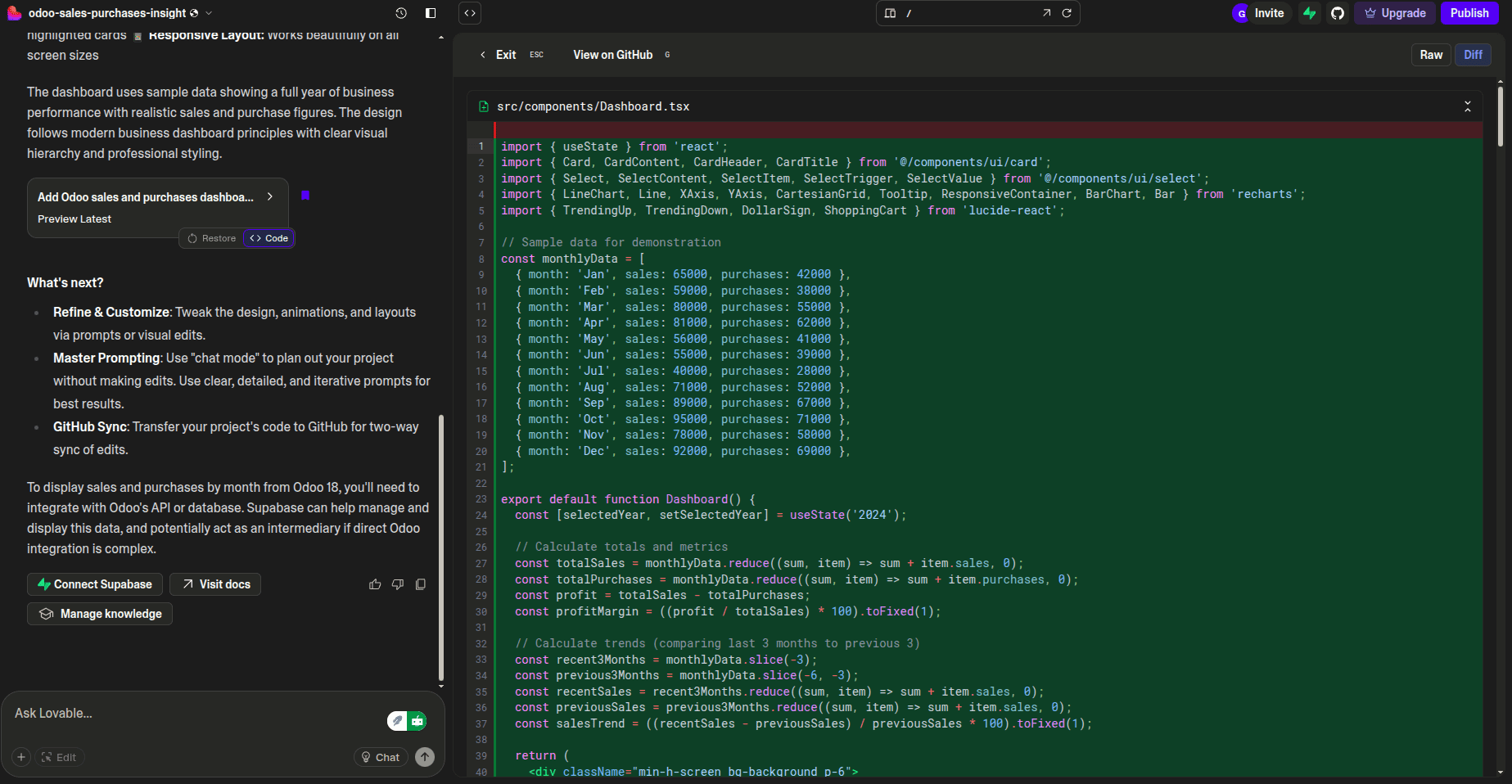
We can visit the Lovable documentation and most importantly, if we want to add custom context and instructions for our project, we can do that also using the Manage Knowledge button.
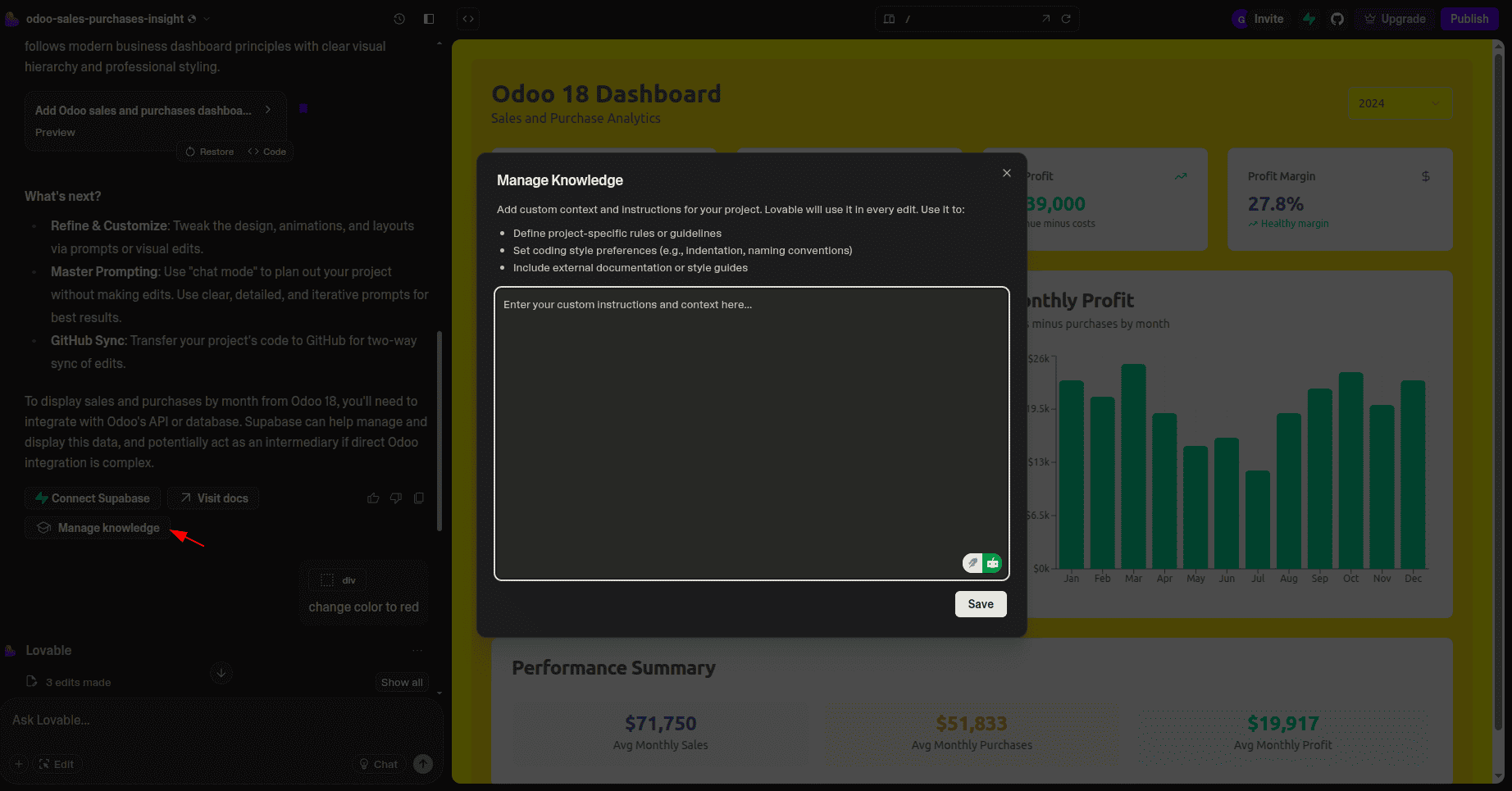
The ability to alter the design directly from Lovable AI is an intriguing and distinctive feature. The edit button at the bottom of the command box allows us to quickly select the area that needs to be changed.
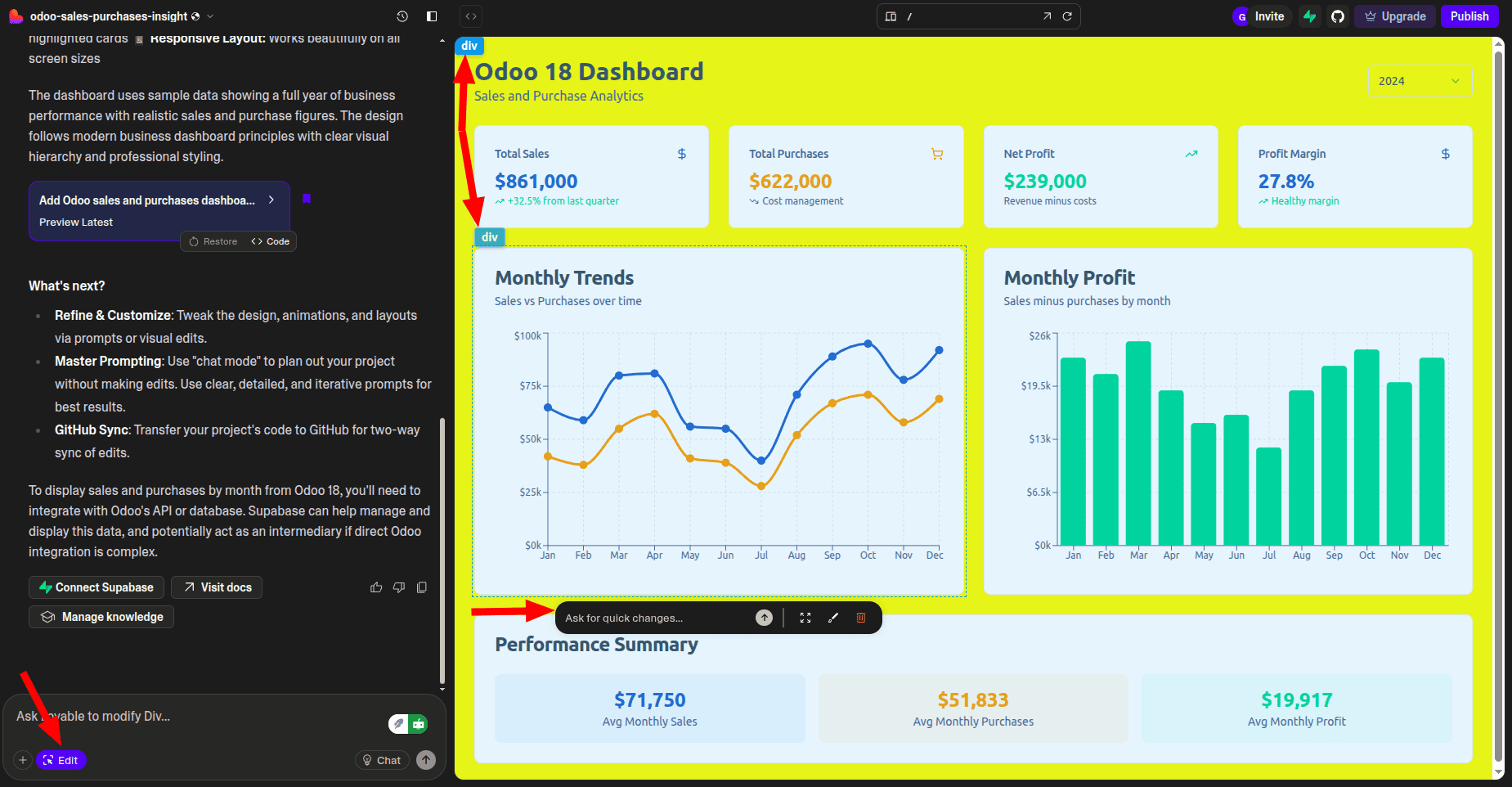
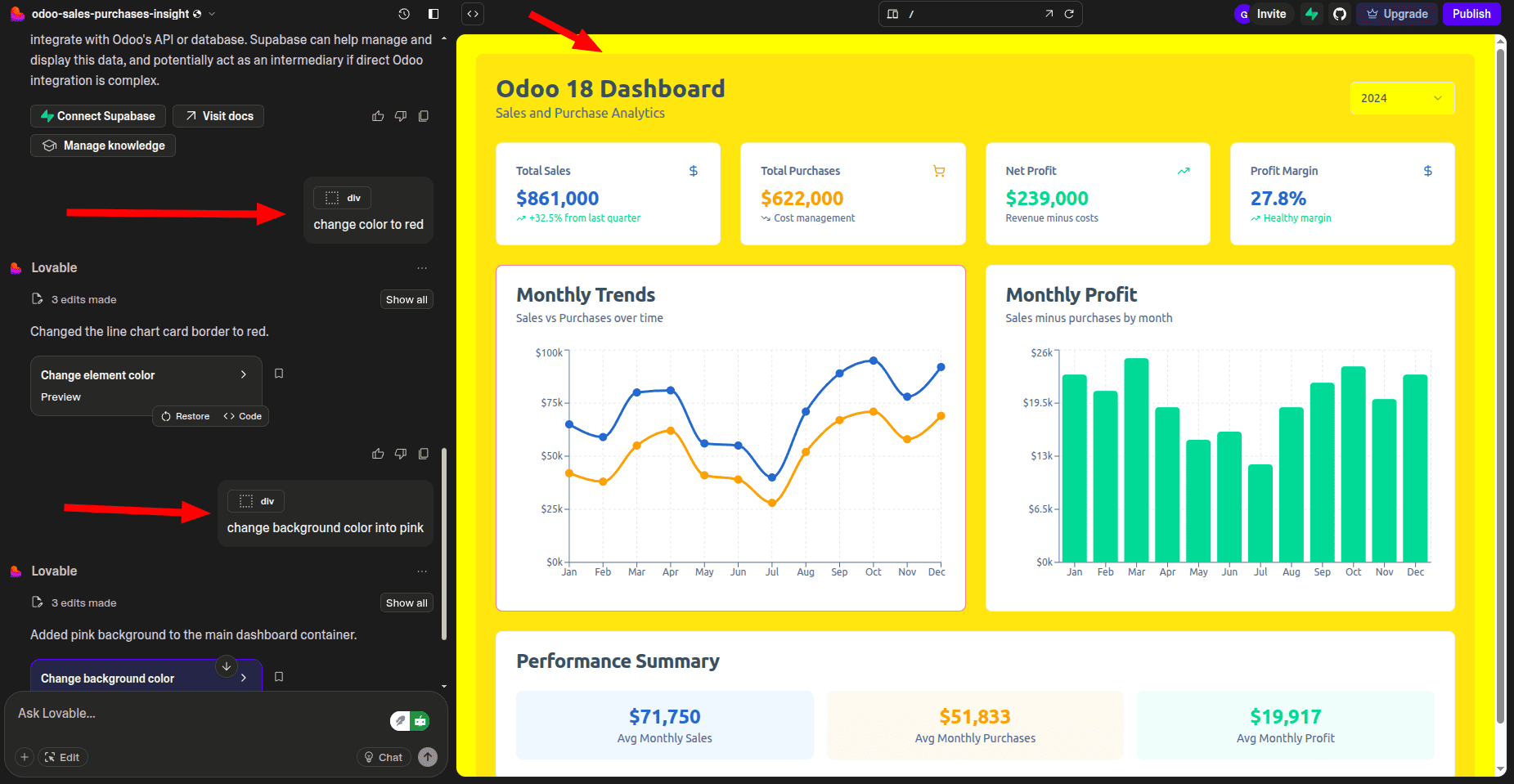
We can view the project on different screen sizes.
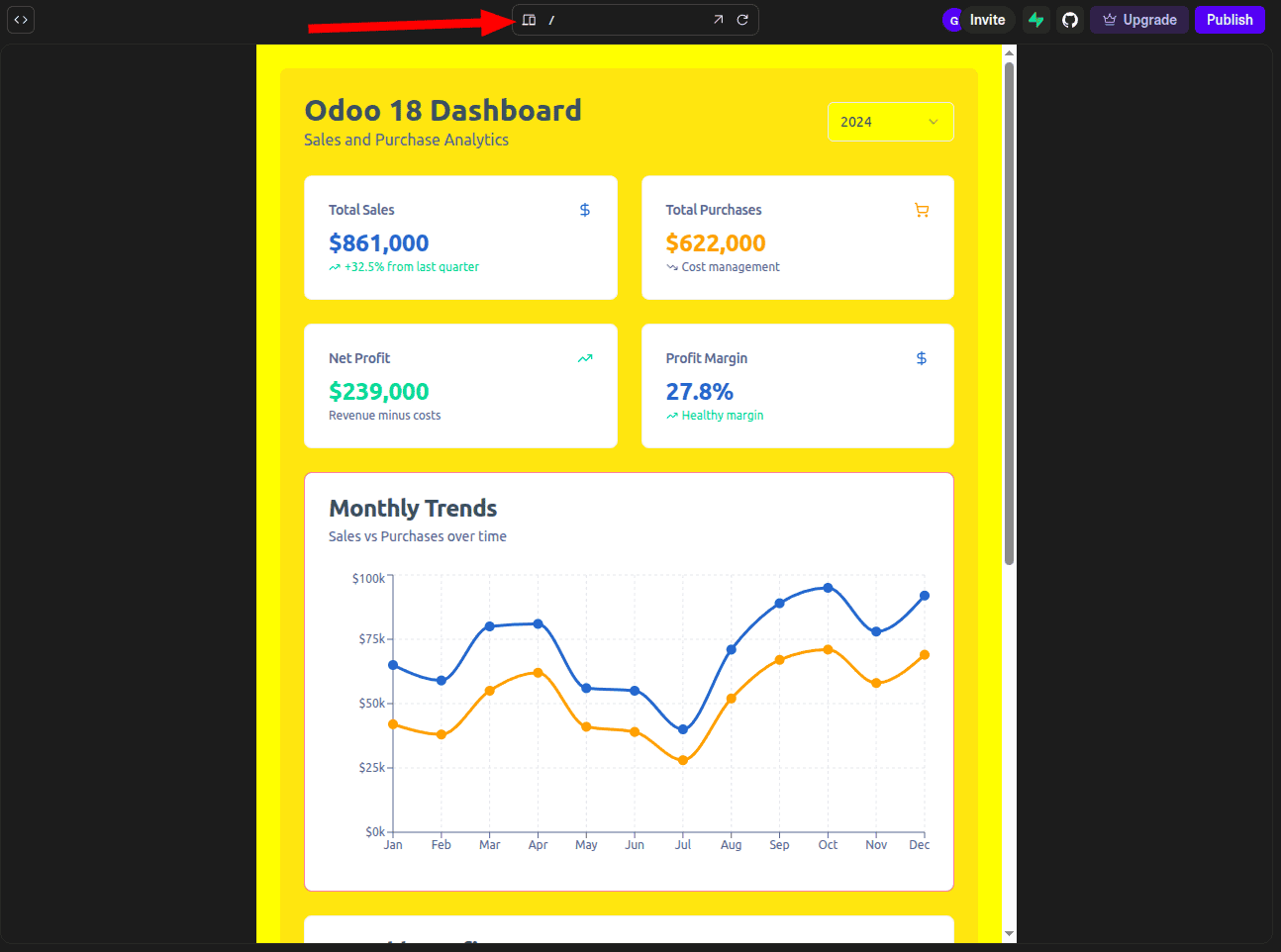
We only need to click once to publish our project. The link to the website where the project is published will be provided. Additionally, it offers the ability to add a custom domain if we so choose.
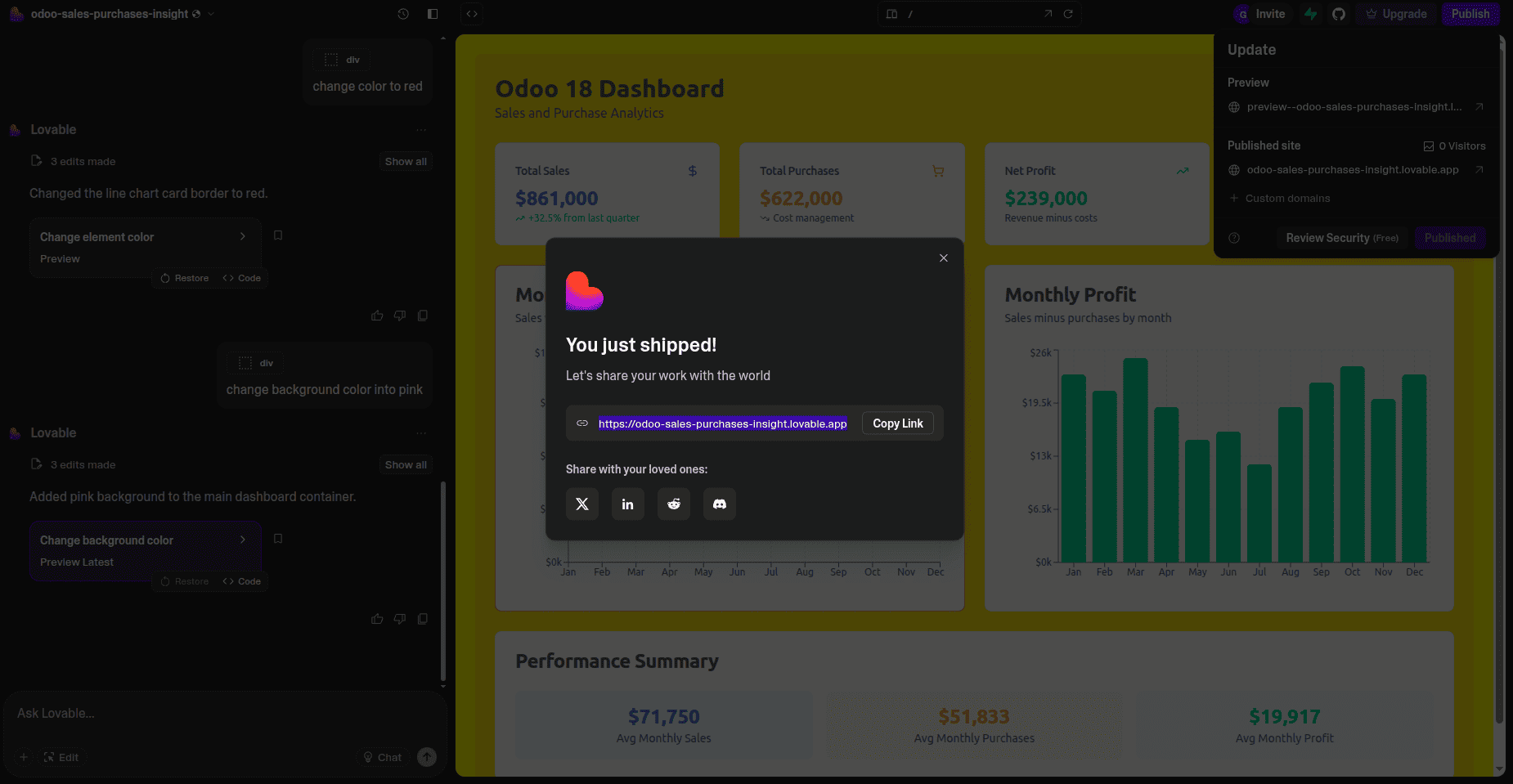
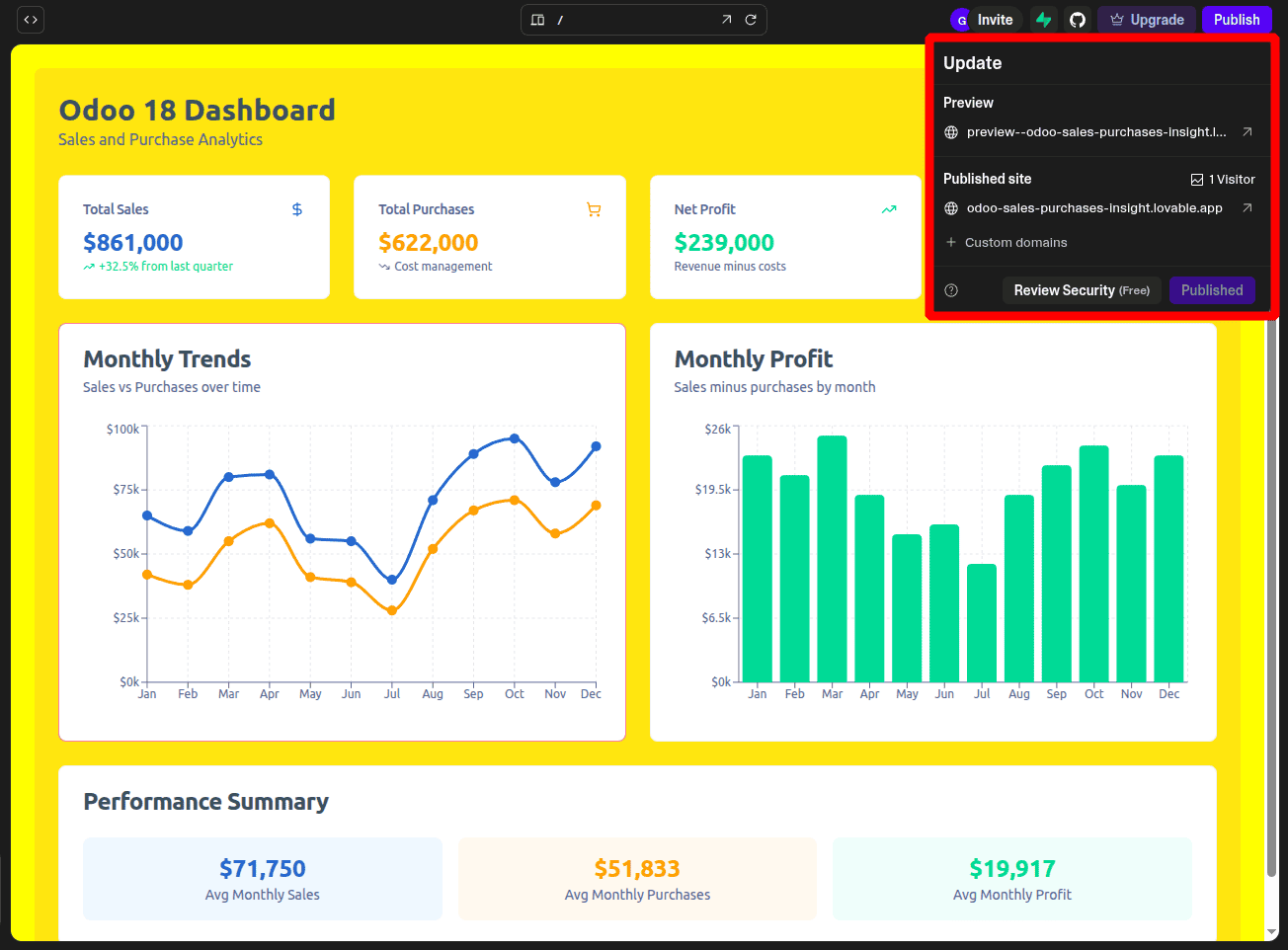
v0 by Vercel
v0 is an AI-powered assistant designed specifically for web developers working with modern technologies like Next.js, React, and the Vercel ecosystem. It's much more than a simple code generator—v0 is a comprehensive development companion that helps you build, debug, and ship web applications from start to finish.
By offering a thorough chat interface that walks you through creating, debugging, and deploying web apps, v0 streamlines the development process. In a single tool, it guarantees access to the most recent data and best practices, boosts developer productivity, and improves the development experience. In contrast to general AI coding assistants, v0 is designed to recognise and address the particular difficulties experienced by developers utilising the Vercel stack.It combines the power of AI with specific knowledge of modern web development frameworks and best practices.
Key Features
- Interactive Code Generation
v0 creates fully functional React components, Next.js applications, and full-stack projects that you can preview and interact with directly in the chat interface.
- End-to-End Development Support
Whether you're starting from a blank page, debugging a frontend issue deep in your company's codebase, or trying to implement a new feature for your side project; v0 can help you ship your applications end-to-end.
- Framework-Aware Intelligence
v0 has deep knowledge of modern web technologies, including:
- Next.js (App Router and Pages Router)
- Tailwind CSS and shadcn/ui components
- Database integrations (Supabase, Neon, Upstash)
- AI integrations (xAI, Groq, Fal, DeepInfra)
- Real-Time Preview
You can see your code come to life instantly with interactive previews, making it easy to iterate and refine your applications.
Gets started
Just like other AI tools, we have to sign up to explore the v0, and we can do that just in two steps. We can create accounts using GitHub and Gmail.
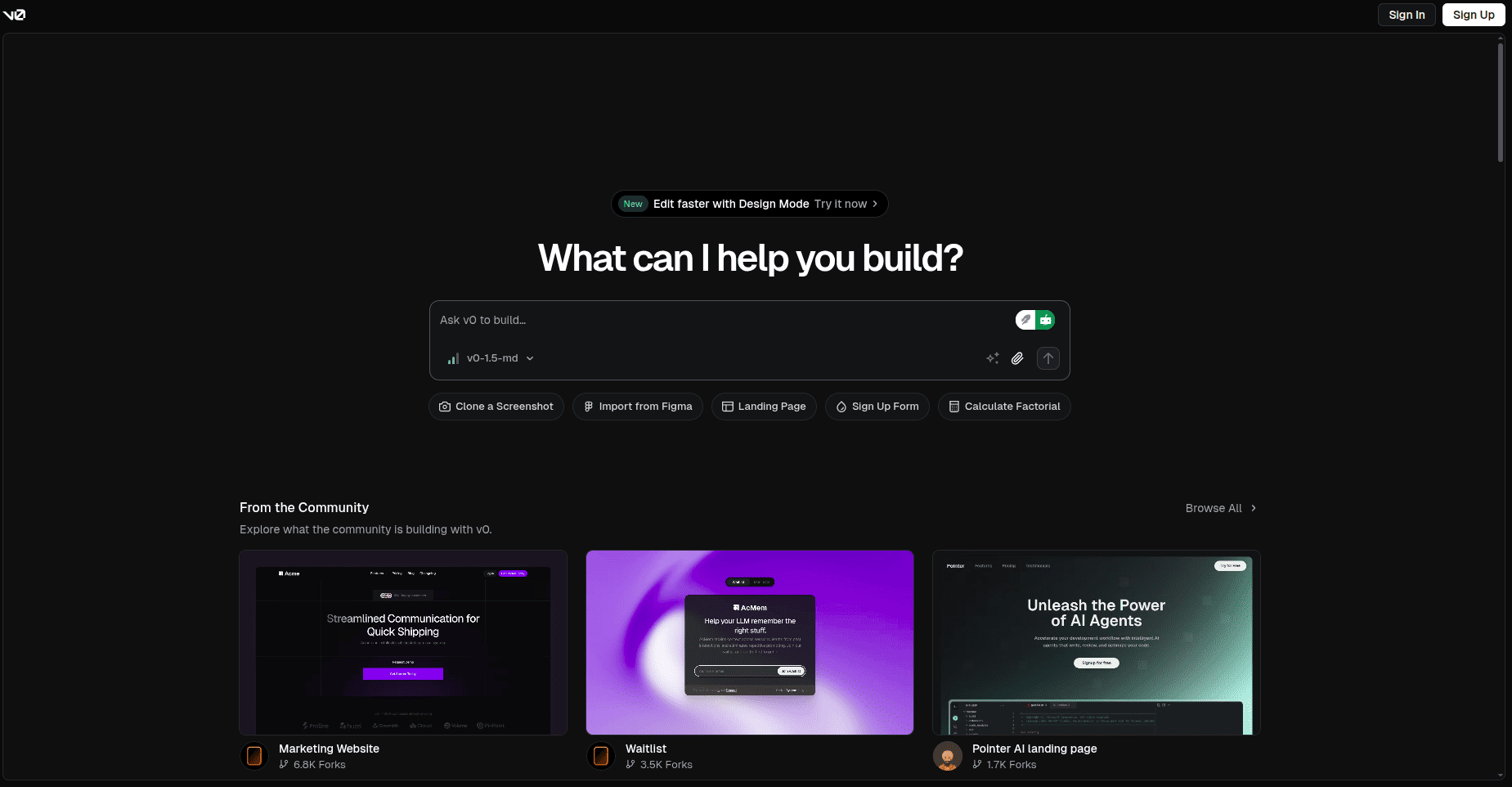
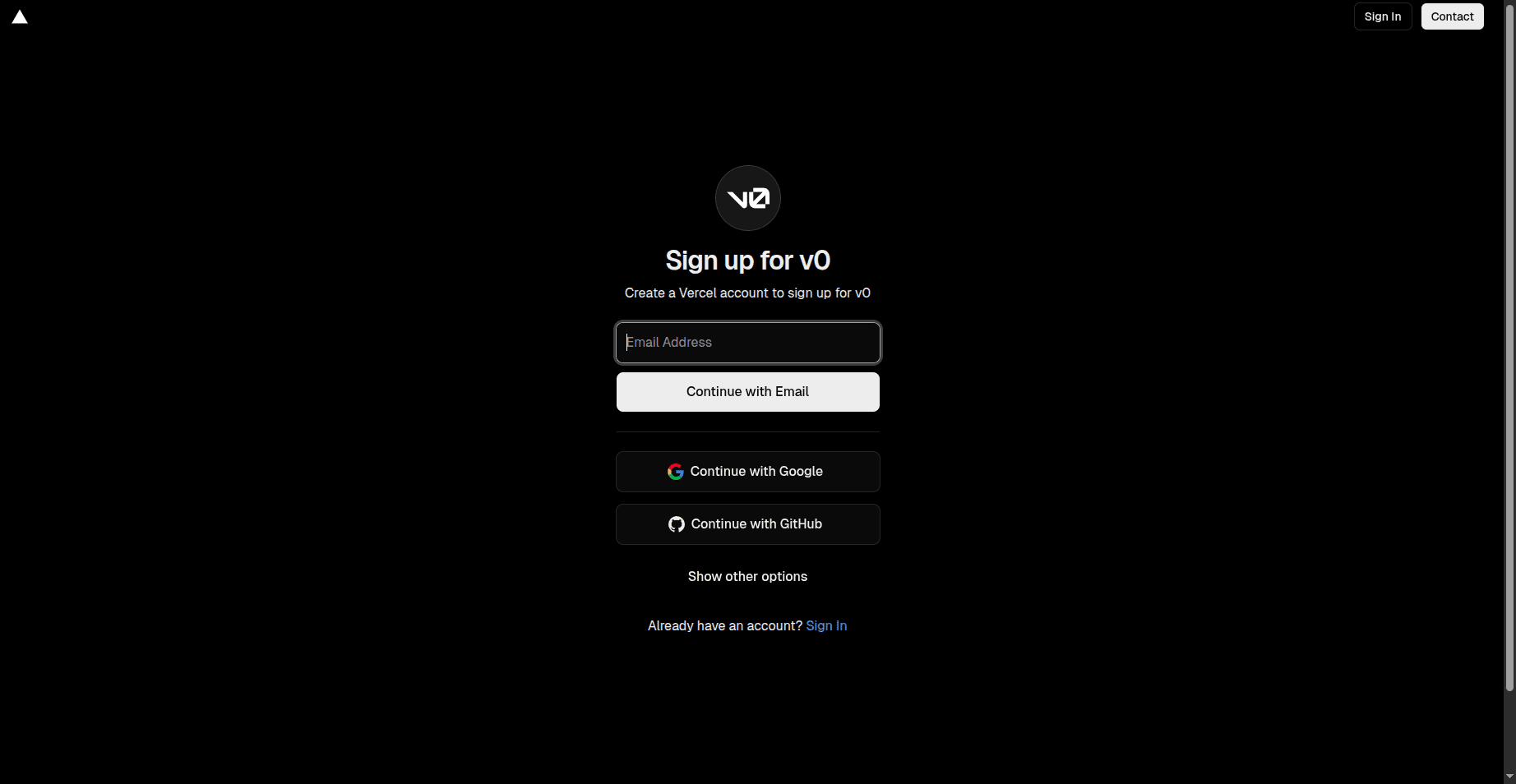
Example
Let’s try to build something using v0. Here I have commanded to create a website to sell the branded shoes. And as we can see, we got a website template. It is not completely responsive like what Bolt built but it has all the page functionalities like a proper website.
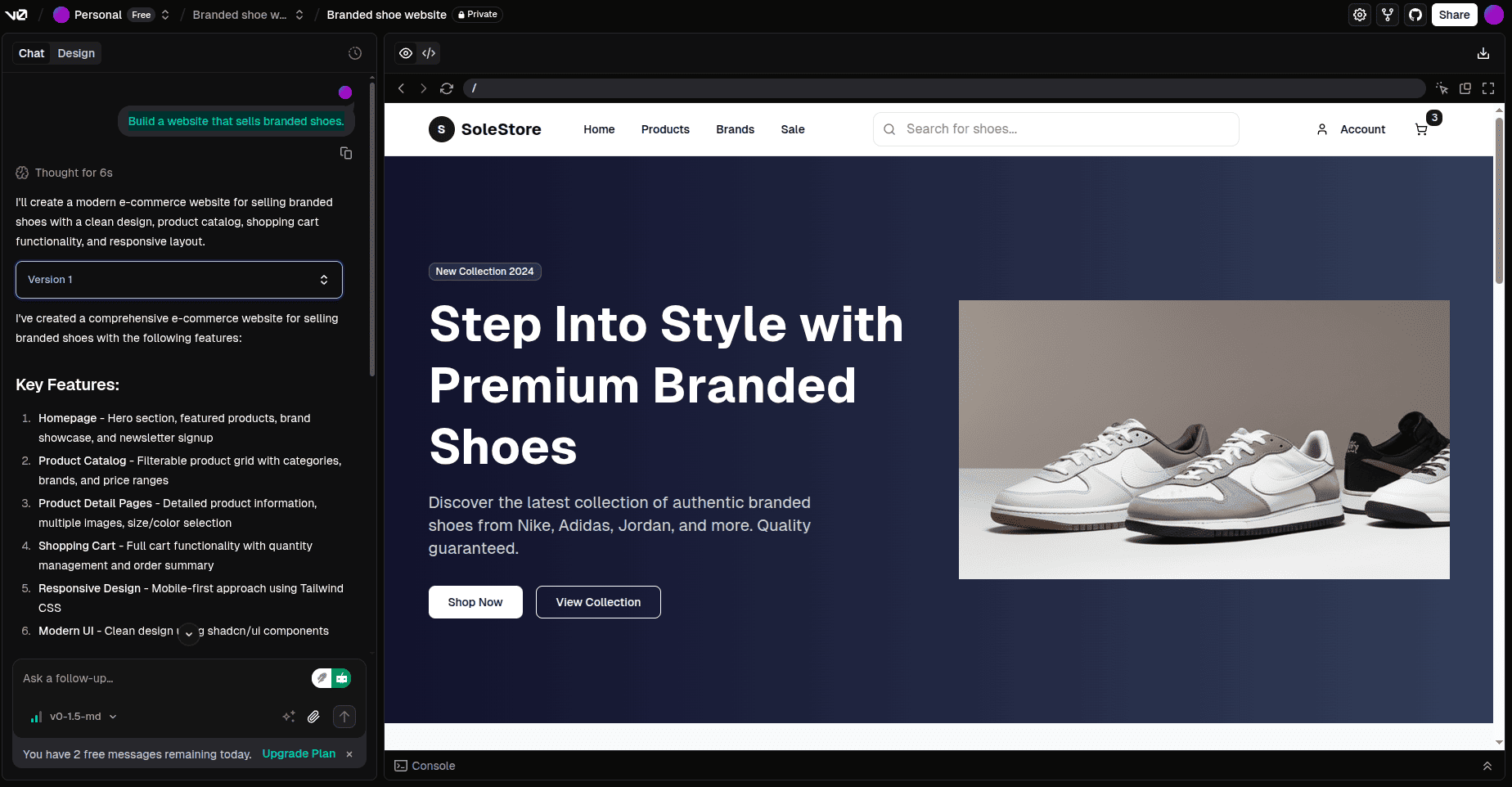
We can switch to code to see the backend. Also, we have the option to copy and download the code. We can download the entire project code and also do the individual file.
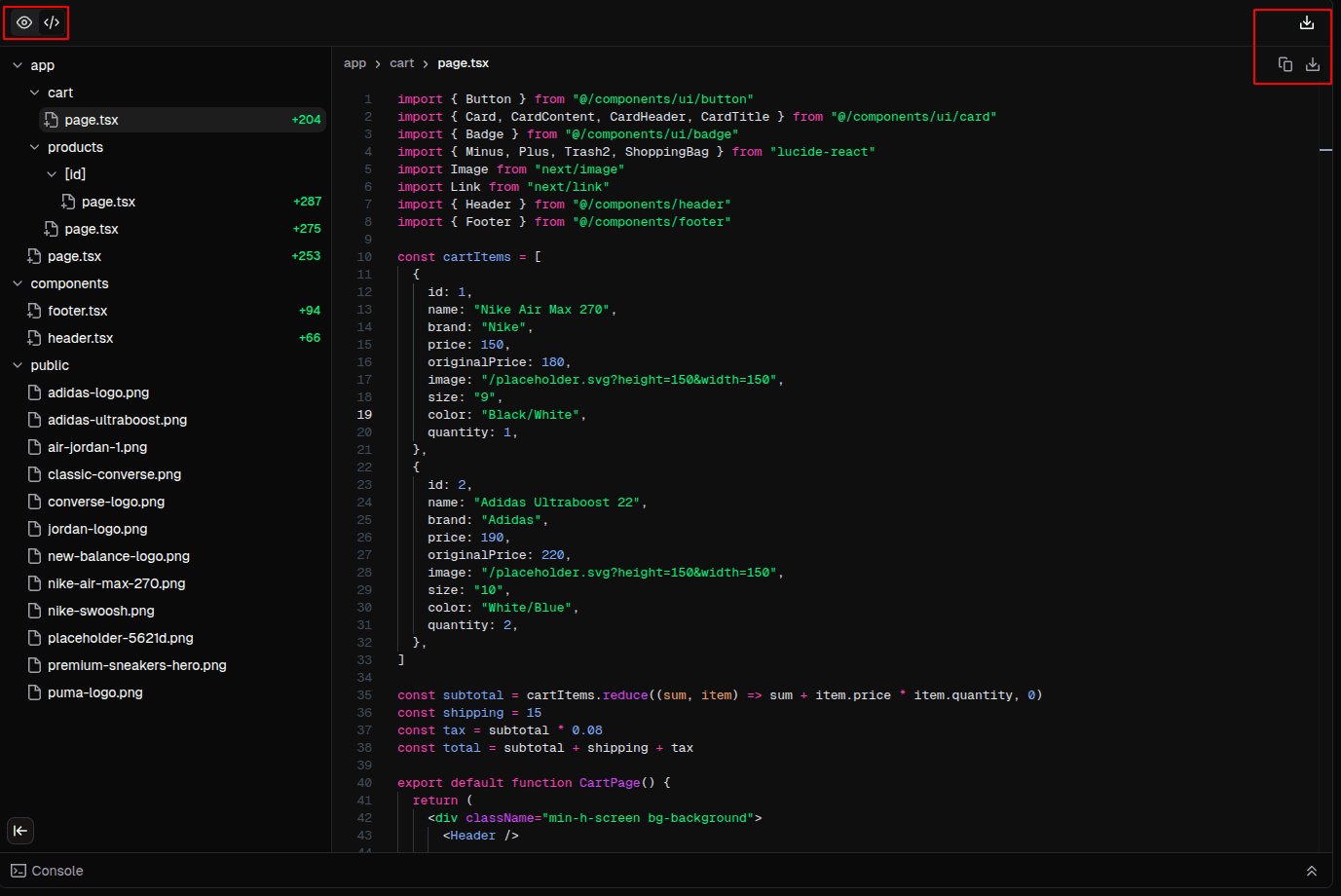
If we want to build a new project from the current project by keeping the first one. We can use the fork button.
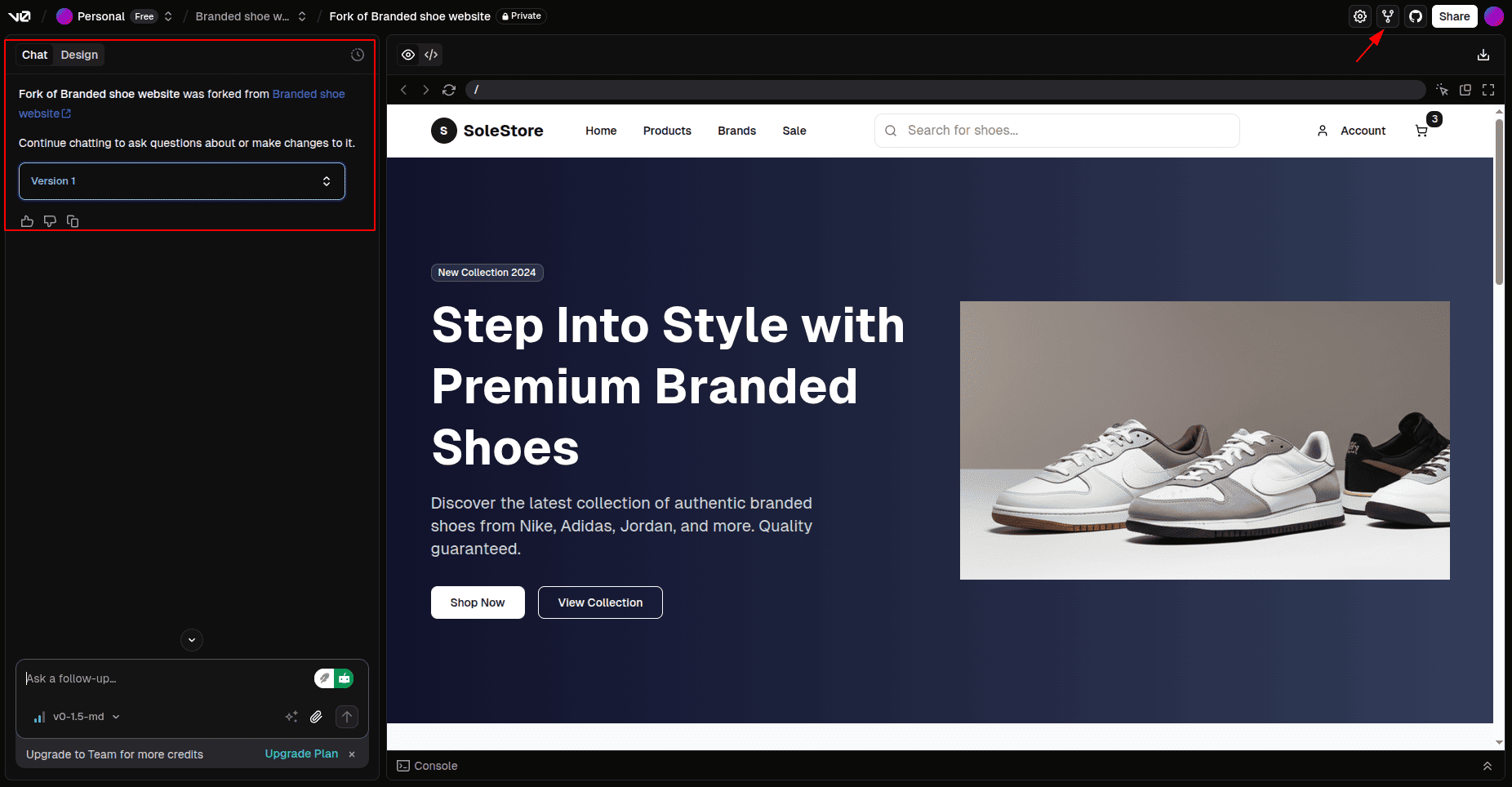
In the top left corner, we can switch between the chat and design. By using the design option, we can easily change the design of the project.
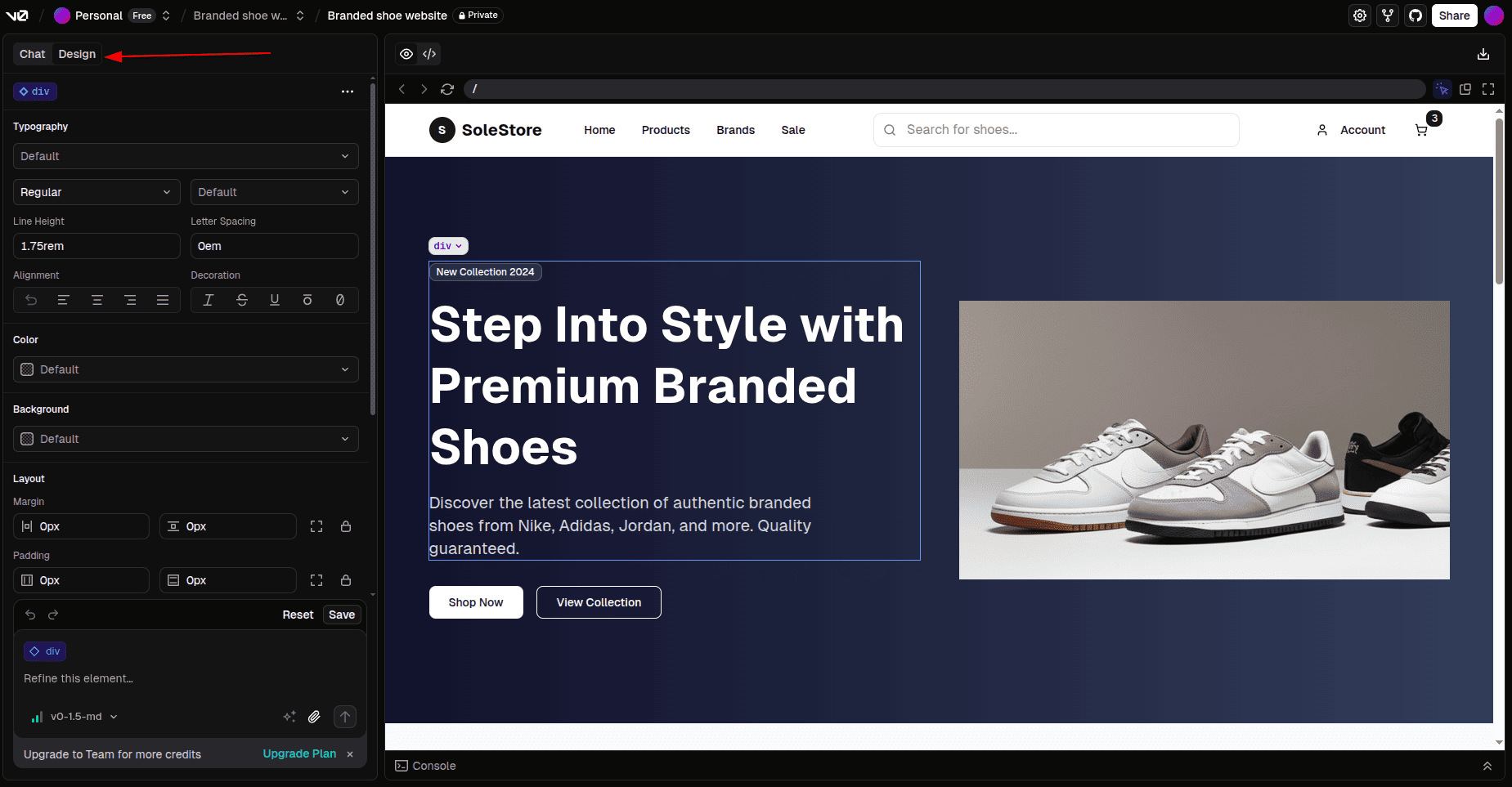
To share or publish the project, we can use the share button. It will be deployed to Vercel.
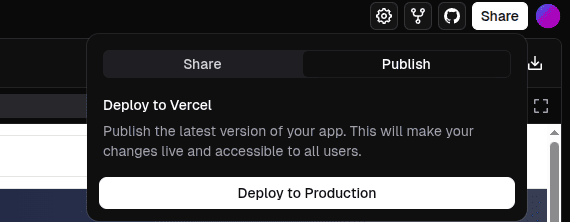
We can see the Vercel model version in the bottom of the chat box. Also, we have the option to enhance the projects and upload files.
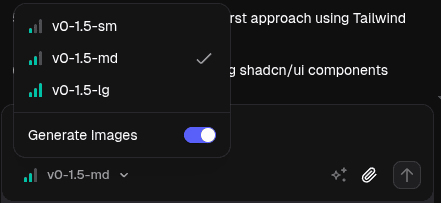
Additionally, we have an inbuilt console provided by Vercel which will help us to debug the code.
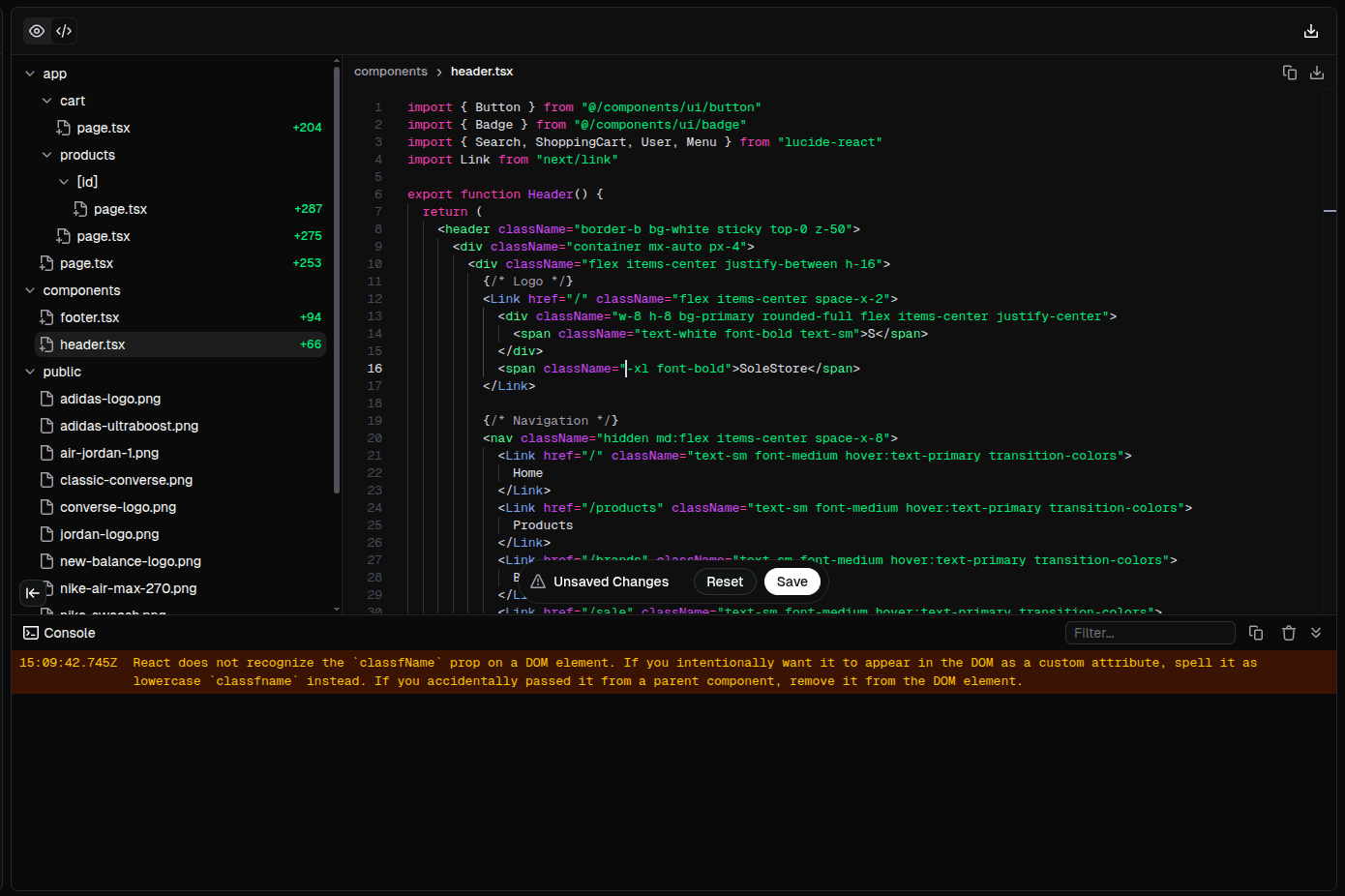
In conclusion, prototyping AI tools play a crucial role in accelerating innovation by simplifying the development process and lowering barriers to entry for AI creation. They empower individuals and teams to transform concepts into functional models quickly, fostering experimentation and creativity while minimizing cost and risk. As these tools continue to evolve, they will further democratize access to artificial intelligence, enabling more people to contribute to the advancement and practical application of intelligent technologies across diverse fields.
To read more about Which are the Best AI Tools for Coding, refer to our blog Which are the Best AI Tools for Coding.